Effectiveness of Mindfulness Based Therapy in Reducing Depression and Suicide Ideation in Military Veterans
VerifiedAdded on 2023/02/01
|26
|6308
|86
AI Summary
This proposal aims to evaluate the impact of psychological intervention on reducing depressive symptoms and preventing suicide ideation in military veterans. The research question focuses on the effectiveness of psychological intervention in reducing symptoms of depression and post-traumatic stress disorder (PTSD) among military veterans within one year. The proposed solution is to implement mindfulness-based cognitive therapy (MBCT) as a psychological intervention to treat depression and suicide ideation in military veterans.
Contribute Materials
Your contribution can guide someone’s learning journey. Share your
documents today.
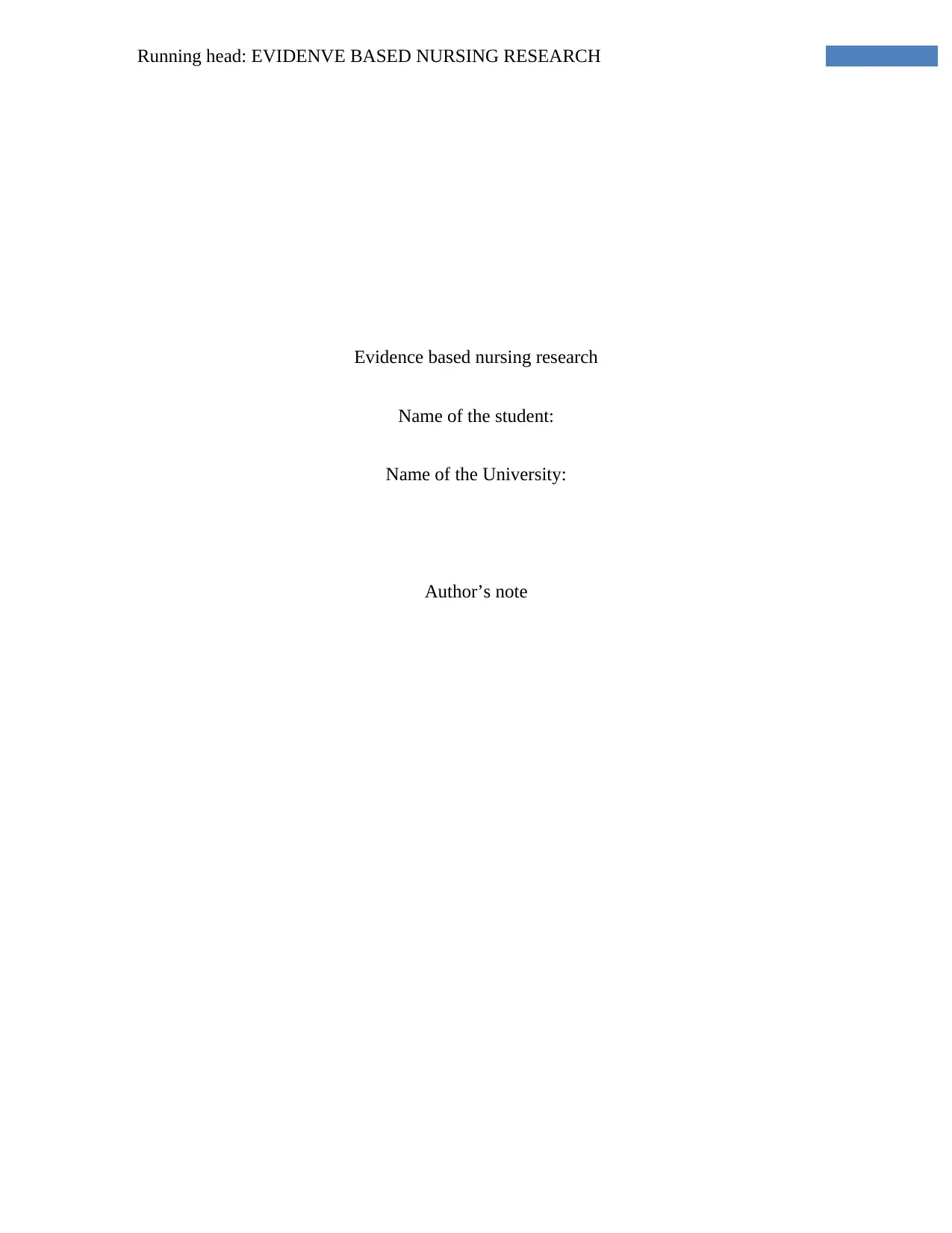
Running head: EVIDENVE BASED NURSING RESEARCH
Evidence based nursing research
Name of the student:
Name of the University:
Author’s note
Evidence based nursing research
Name of the student:
Name of the University:
Author’s note
Secure Best Marks with AI Grader
Need help grading? Try our AI Grader for instant feedback on your assignments.
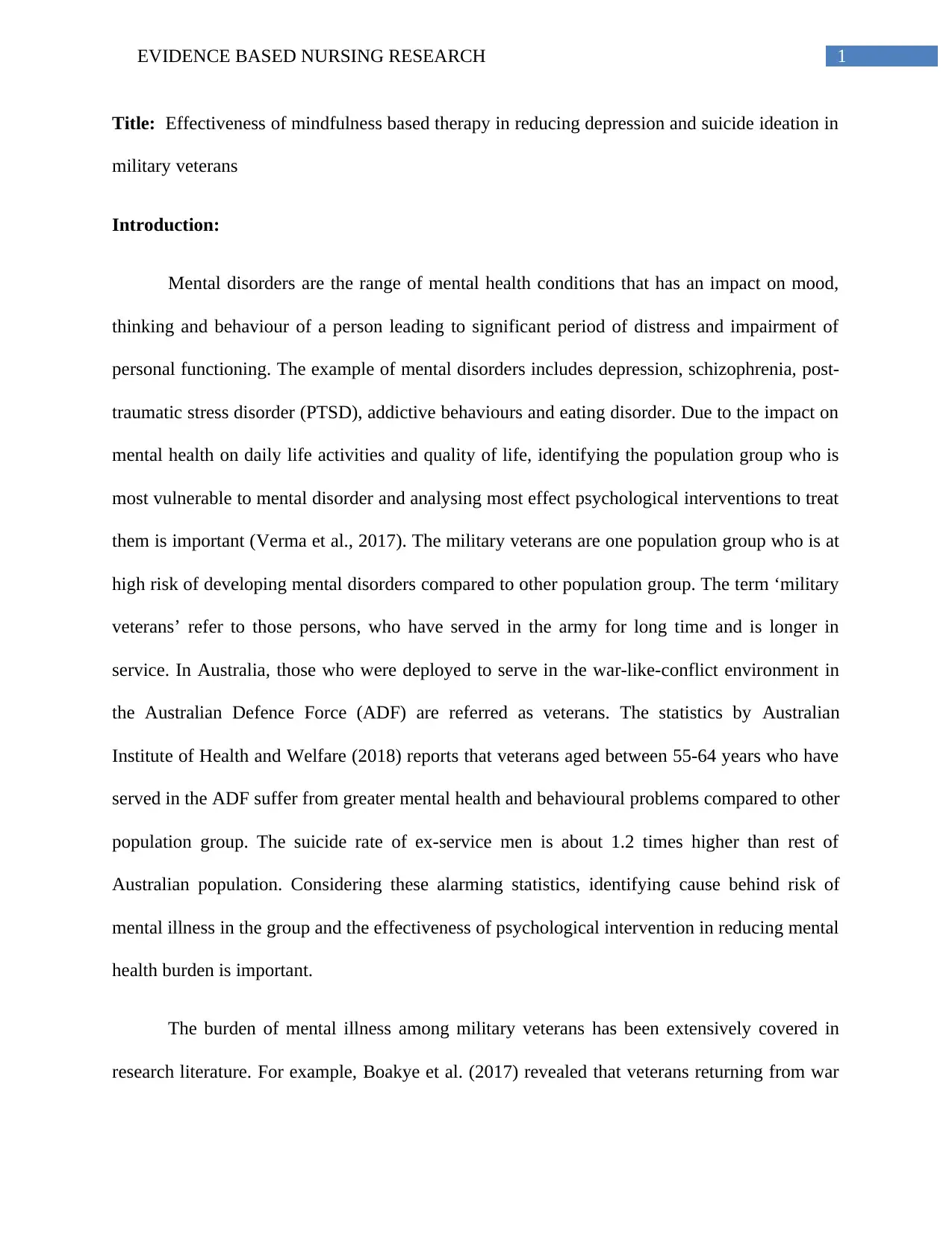
1EVIDENCE BASED NURSING RESEARCH
Title: Effectiveness of mindfulness based therapy in reducing depression and suicide ideation in
military veterans
Introduction:
Mental disorders are the range of mental health conditions that has an impact on mood,
thinking and behaviour of a person leading to significant period of distress and impairment of
personal functioning. The example of mental disorders includes depression, schizophrenia, post-
traumatic stress disorder (PTSD), addictive behaviours and eating disorder. Due to the impact on
mental health on daily life activities and quality of life, identifying the population group who is
most vulnerable to mental disorder and analysing most effect psychological interventions to treat
them is important (Verma et al., 2017). The military veterans are one population group who is at
high risk of developing mental disorders compared to other population group. The term ‘military
veterans’ refer to those persons, who have served in the army for long time and is longer in
service. In Australia, those who were deployed to serve in the war-like-conflict environment in
the Australian Defence Force (ADF) are referred as veterans. The statistics by Australian
Institute of Health and Welfare (2018) reports that veterans aged between 55-64 years who have
served in the ADF suffer from greater mental health and behavioural problems compared to other
population group. The suicide rate of ex-service men is about 1.2 times higher than rest of
Australian population. Considering these alarming statistics, identifying cause behind risk of
mental illness in the group and the effectiveness of psychological intervention in reducing mental
health burden is important.
The burden of mental illness among military veterans has been extensively covered in
research literature. For example, Boakye et al. (2017) revealed that veterans returning from war
Title: Effectiveness of mindfulness based therapy in reducing depression and suicide ideation in
military veterans
Introduction:
Mental disorders are the range of mental health conditions that has an impact on mood,
thinking and behaviour of a person leading to significant period of distress and impairment of
personal functioning. The example of mental disorders includes depression, schizophrenia, post-
traumatic stress disorder (PTSD), addictive behaviours and eating disorder. Due to the impact on
mental health on daily life activities and quality of life, identifying the population group who is
most vulnerable to mental disorder and analysing most effect psychological interventions to treat
them is important (Verma et al., 2017). The military veterans are one population group who is at
high risk of developing mental disorders compared to other population group. The term ‘military
veterans’ refer to those persons, who have served in the army for long time and is longer in
service. In Australia, those who were deployed to serve in the war-like-conflict environment in
the Australian Defence Force (ADF) are referred as veterans. The statistics by Australian
Institute of Health and Welfare (2018) reports that veterans aged between 55-64 years who have
served in the ADF suffer from greater mental health and behavioural problems compared to other
population group. The suicide rate of ex-service men is about 1.2 times higher than rest of
Australian population. Considering these alarming statistics, identifying cause behind risk of
mental illness in the group and the effectiveness of psychological intervention in reducing mental
health burden is important.
The burden of mental illness among military veterans has been extensively covered in
research literature. For example, Boakye et al. (2017) revealed that veterans returning from war
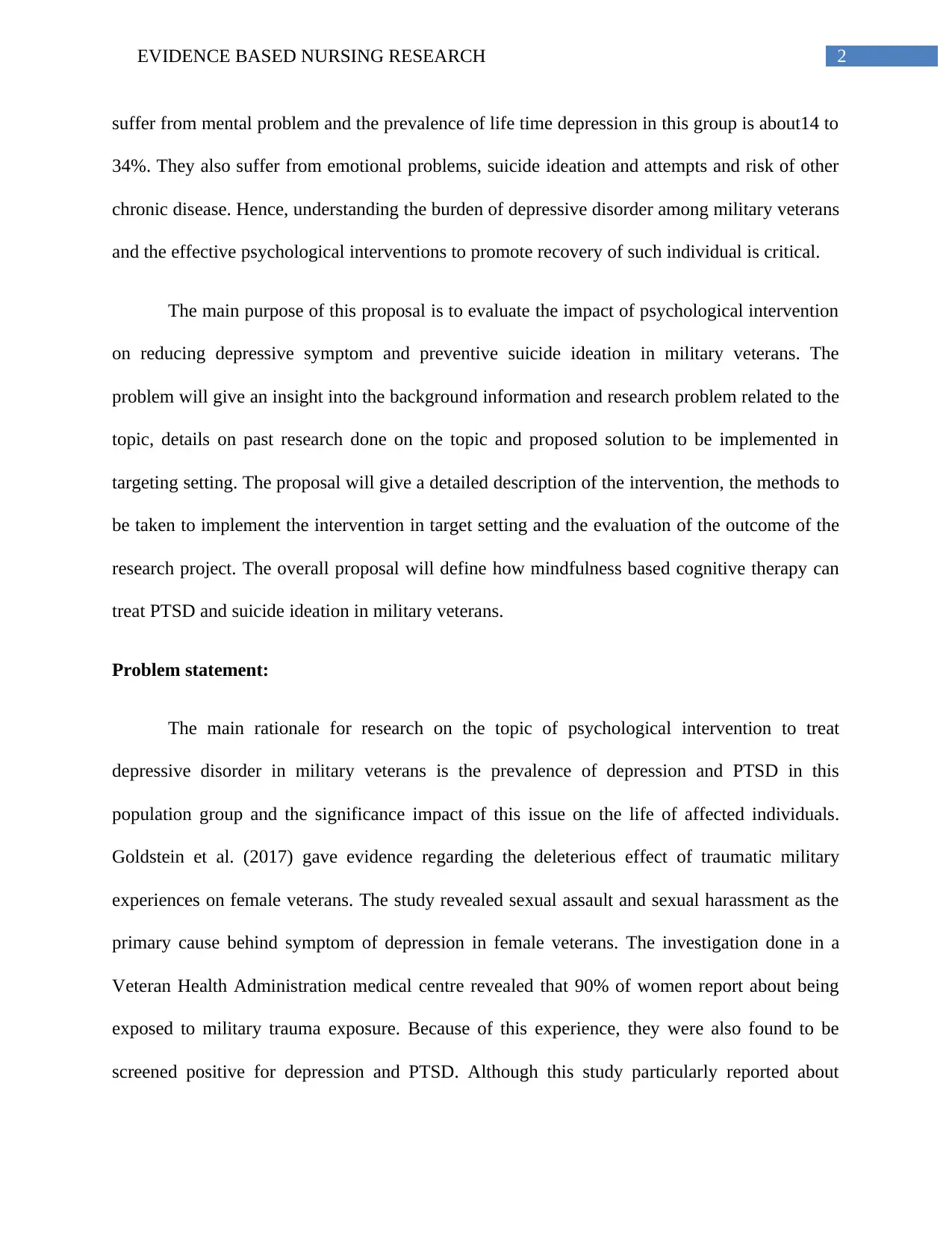
2EVIDENCE BASED NURSING RESEARCH
suffer from mental problem and the prevalence of life time depression in this group is about14 to
34%. They also suffer from emotional problems, suicide ideation and attempts and risk of other
chronic disease. Hence, understanding the burden of depressive disorder among military veterans
and the effective psychological interventions to promote recovery of such individual is critical.
The main purpose of this proposal is to evaluate the impact of psychological intervention
on reducing depressive symptom and preventive suicide ideation in military veterans. The
problem will give an insight into the background information and research problem related to the
topic, details on past research done on the topic and proposed solution to be implemented in
targeting setting. The proposal will give a detailed description of the intervention, the methods to
be taken to implement the intervention in target setting and the evaluation of the outcome of the
research project. The overall proposal will define how mindfulness based cognitive therapy can
treat PTSD and suicide ideation in military veterans.
Problem statement:
The main rationale for research on the topic of psychological intervention to treat
depressive disorder in military veterans is the prevalence of depression and PTSD in this
population group and the significance impact of this issue on the life of affected individuals.
Goldstein et al. (2017) gave evidence regarding the deleterious effect of traumatic military
experiences on female veterans. The study revealed sexual assault and sexual harassment as the
primary cause behind symptom of depression in female veterans. The investigation done in a
Veteran Health Administration medical centre revealed that 90% of women report about being
exposed to military trauma exposure. Because of this experience, they were also found to be
screened positive for depression and PTSD. Although this study particularly reported about
suffer from mental problem and the prevalence of life time depression in this group is about14 to
34%. They also suffer from emotional problems, suicide ideation and attempts and risk of other
chronic disease. Hence, understanding the burden of depressive disorder among military veterans
and the effective psychological interventions to promote recovery of such individual is critical.
The main purpose of this proposal is to evaluate the impact of psychological intervention
on reducing depressive symptom and preventive suicide ideation in military veterans. The
problem will give an insight into the background information and research problem related to the
topic, details on past research done on the topic and proposed solution to be implemented in
targeting setting. The proposal will give a detailed description of the intervention, the methods to
be taken to implement the intervention in target setting and the evaluation of the outcome of the
research project. The overall proposal will define how mindfulness based cognitive therapy can
treat PTSD and suicide ideation in military veterans.
Problem statement:
The main rationale for research on the topic of psychological intervention to treat
depressive disorder in military veterans is the prevalence of depression and PTSD in this
population group and the significance impact of this issue on the life of affected individuals.
Goldstein et al. (2017) gave evidence regarding the deleterious effect of traumatic military
experiences on female veterans. The study revealed sexual assault and sexual harassment as the
primary cause behind symptom of depression in female veterans. The investigation done in a
Veteran Health Administration medical centre revealed that 90% of women report about being
exposed to military trauma exposure. Because of this experience, they were also found to be
screened positive for depression and PTSD. Although this study particularly reported about
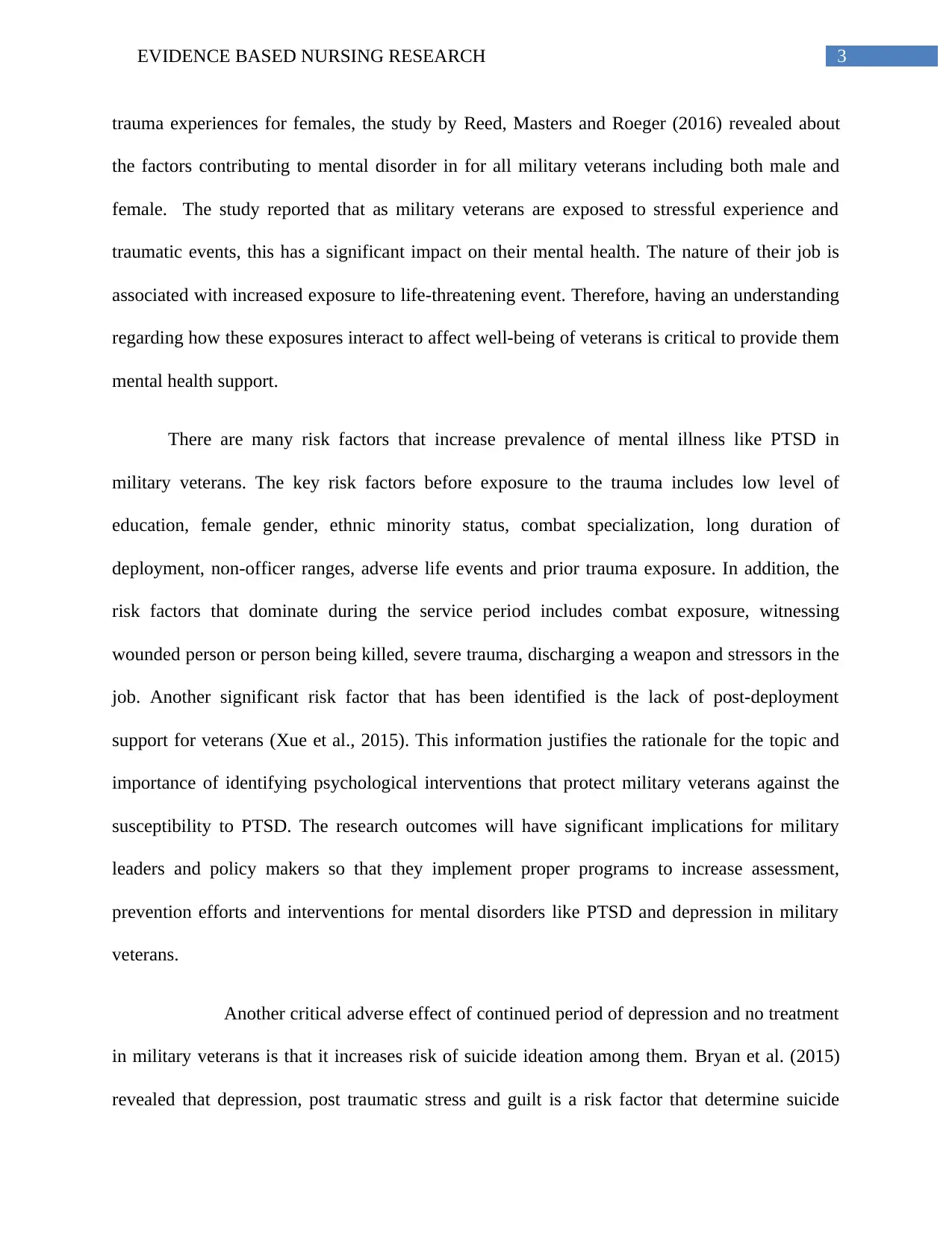
3EVIDENCE BASED NURSING RESEARCH
trauma experiences for females, the study by Reed, Masters and Roeger (2016) revealed about
the factors contributing to mental disorder in for all military veterans including both male and
female. The study reported that as military veterans are exposed to stressful experience and
traumatic events, this has a significant impact on their mental health. The nature of their job is
associated with increased exposure to life-threatening event. Therefore, having an understanding
regarding how these exposures interact to affect well-being of veterans is critical to provide them
mental health support.
There are many risk factors that increase prevalence of mental illness like PTSD in
military veterans. The key risk factors before exposure to the trauma includes low level of
education, female gender, ethnic minority status, combat specialization, long duration of
deployment, non-officer ranges, adverse life events and prior trauma exposure. In addition, the
risk factors that dominate during the service period includes combat exposure, witnessing
wounded person or person being killed, severe trauma, discharging a weapon and stressors in the
job. Another significant risk factor that has been identified is the lack of post-deployment
support for veterans (Xue et al., 2015). This information justifies the rationale for the topic and
importance of identifying psychological interventions that protect military veterans against the
susceptibility to PTSD. The research outcomes will have significant implications for military
leaders and policy makers so that they implement proper programs to increase assessment,
prevention efforts and interventions for mental disorders like PTSD and depression in military
veterans.
Another critical adverse effect of continued period of depression and no treatment
in military veterans is that it increases risk of suicide ideation among them. Bryan et al. (2015)
revealed that depression, post traumatic stress and guilt is a risk factor that determine suicide
trauma experiences for females, the study by Reed, Masters and Roeger (2016) revealed about
the factors contributing to mental disorder in for all military veterans including both male and
female. The study reported that as military veterans are exposed to stressful experience and
traumatic events, this has a significant impact on their mental health. The nature of their job is
associated with increased exposure to life-threatening event. Therefore, having an understanding
regarding how these exposures interact to affect well-being of veterans is critical to provide them
mental health support.
There are many risk factors that increase prevalence of mental illness like PTSD in
military veterans. The key risk factors before exposure to the trauma includes low level of
education, female gender, ethnic minority status, combat specialization, long duration of
deployment, non-officer ranges, adverse life events and prior trauma exposure. In addition, the
risk factors that dominate during the service period includes combat exposure, witnessing
wounded person or person being killed, severe trauma, discharging a weapon and stressors in the
job. Another significant risk factor that has been identified is the lack of post-deployment
support for veterans (Xue et al., 2015). This information justifies the rationale for the topic and
importance of identifying psychological interventions that protect military veterans against the
susceptibility to PTSD. The research outcomes will have significant implications for military
leaders and policy makers so that they implement proper programs to increase assessment,
prevention efforts and interventions for mental disorders like PTSD and depression in military
veterans.
Another critical adverse effect of continued period of depression and no treatment
in military veterans is that it increases risk of suicide ideation among them. Bryan et al. (2015)
revealed that depression, post traumatic stress and guilt is a risk factor that determine suicide
Secure Best Marks with AI Grader
Need help grading? Try our AI Grader for instant feedback on your assignments.
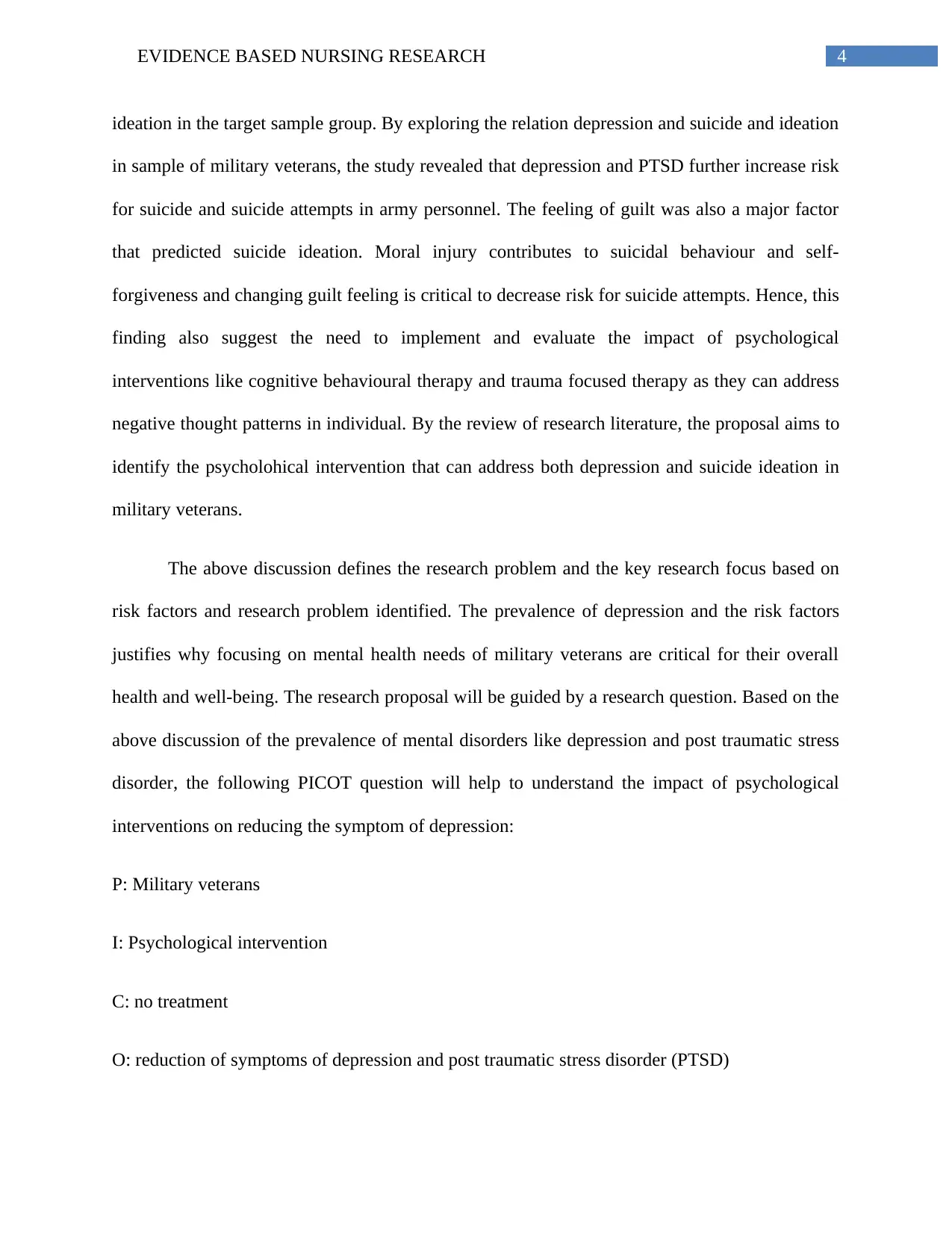
4EVIDENCE BASED NURSING RESEARCH
ideation in the target sample group. By exploring the relation depression and suicide and ideation
in sample of military veterans, the study revealed that depression and PTSD further increase risk
for suicide and suicide attempts in army personnel. The feeling of guilt was also a major factor
that predicted suicide ideation. Moral injury contributes to suicidal behaviour and self-
forgiveness and changing guilt feeling is critical to decrease risk for suicide attempts. Hence, this
finding also suggest the need to implement and evaluate the impact of psychological
interventions like cognitive behavioural therapy and trauma focused therapy as they can address
negative thought patterns in individual. By the review of research literature, the proposal aims to
identify the psycholohical intervention that can address both depression and suicide ideation in
military veterans.
The above discussion defines the research problem and the key research focus based on
risk factors and research problem identified. The prevalence of depression and the risk factors
justifies why focusing on mental health needs of military veterans are critical for their overall
health and well-being. The research proposal will be guided by a research question. Based on the
above discussion of the prevalence of mental disorders like depression and post traumatic stress
disorder, the following PICOT question will help to understand the impact of psychological
interventions on reducing the symptom of depression:
P: Military veterans
I: Psychological intervention
C: no treatment
O: reduction of symptoms of depression and post traumatic stress disorder (PTSD)
ideation in the target sample group. By exploring the relation depression and suicide and ideation
in sample of military veterans, the study revealed that depression and PTSD further increase risk
for suicide and suicide attempts in army personnel. The feeling of guilt was also a major factor
that predicted suicide ideation. Moral injury contributes to suicidal behaviour and self-
forgiveness and changing guilt feeling is critical to decrease risk for suicide attempts. Hence, this
finding also suggest the need to implement and evaluate the impact of psychological
interventions like cognitive behavioural therapy and trauma focused therapy as they can address
negative thought patterns in individual. By the review of research literature, the proposal aims to
identify the psycholohical intervention that can address both depression and suicide ideation in
military veterans.
The above discussion defines the research problem and the key research focus based on
risk factors and research problem identified. The prevalence of depression and the risk factors
justifies why focusing on mental health needs of military veterans are critical for their overall
health and well-being. The research proposal will be guided by a research question. Based on the
above discussion of the prevalence of mental disorders like depression and post traumatic stress
disorder, the following PICOT question will help to understand the impact of psychological
interventions on reducing the symptom of depression:
P: Military veterans
I: Psychological intervention
C: no treatment
O: reduction of symptoms of depression and post traumatic stress disorder (PTSD)
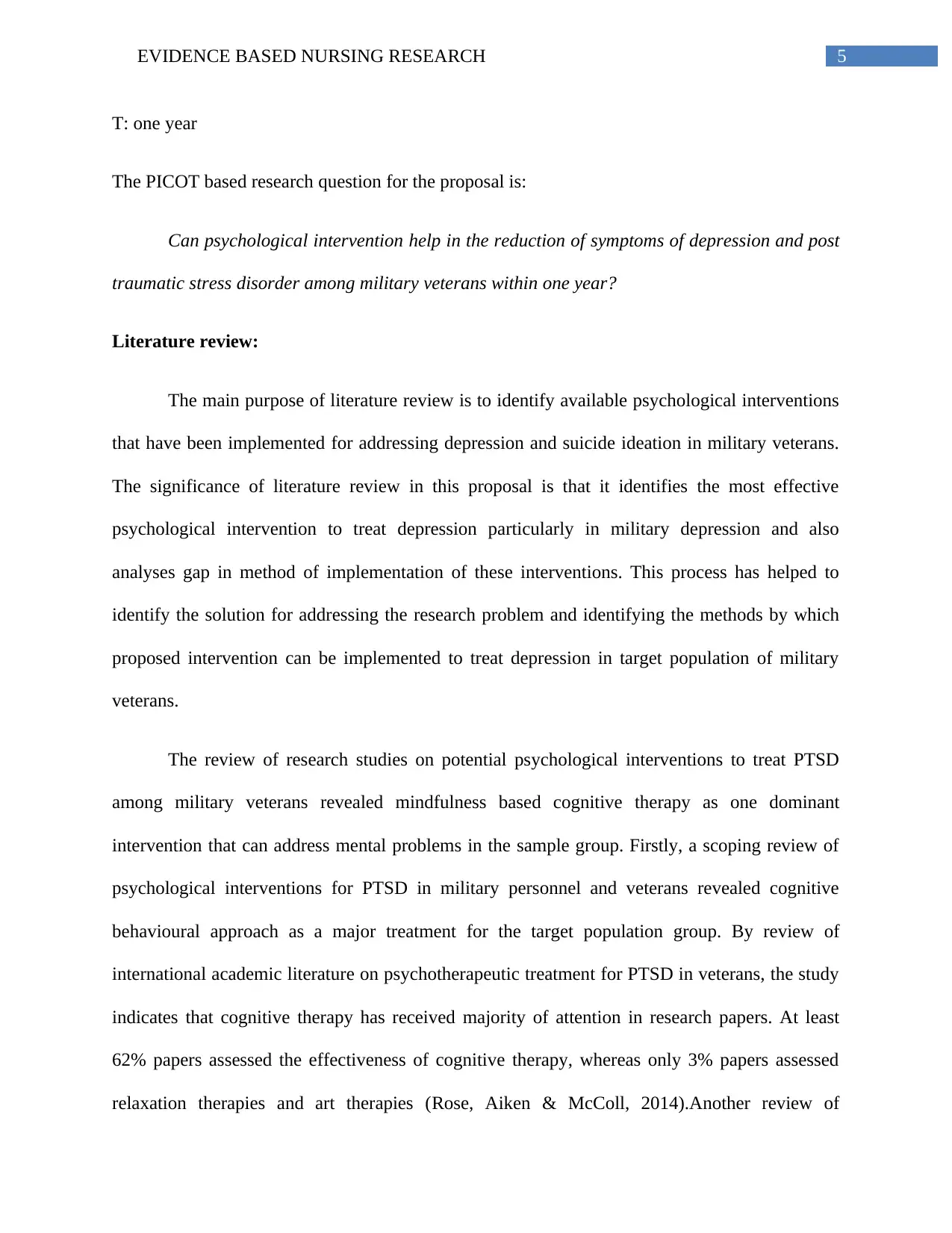
5EVIDENCE BASED NURSING RESEARCH
T: one year
The PICOT based research question for the proposal is:
Can psychological intervention help in the reduction of symptoms of depression and post
traumatic stress disorder among military veterans within one year?
Literature review:
The main purpose of literature review is to identify available psychological interventions
that have been implemented for addressing depression and suicide ideation in military veterans.
The significance of literature review in this proposal is that it identifies the most effective
psychological intervention to treat depression particularly in military depression and also
analyses gap in method of implementation of these interventions. This process has helped to
identify the solution for addressing the research problem and identifying the methods by which
proposed intervention can be implemented to treat depression in target population of military
veterans.
The review of research studies on potential psychological interventions to treat PTSD
among military veterans revealed mindfulness based cognitive therapy as one dominant
intervention that can address mental problems in the sample group. Firstly, a scoping review of
psychological interventions for PTSD in military personnel and veterans revealed cognitive
behavioural approach as a major treatment for the target population group. By review of
international academic literature on psychotherapeutic treatment for PTSD in veterans, the study
indicates that cognitive therapy has received majority of attention in research papers. At least
62% papers assessed the effectiveness of cognitive therapy, whereas only 3% papers assessed
relaxation therapies and art therapies (Rose, Aiken & McColl, 2014).Another review of
T: one year
The PICOT based research question for the proposal is:
Can psychological intervention help in the reduction of symptoms of depression and post
traumatic stress disorder among military veterans within one year?
Literature review:
The main purpose of literature review is to identify available psychological interventions
that have been implemented for addressing depression and suicide ideation in military veterans.
The significance of literature review in this proposal is that it identifies the most effective
psychological intervention to treat depression particularly in military depression and also
analyses gap in method of implementation of these interventions. This process has helped to
identify the solution for addressing the research problem and identifying the methods by which
proposed intervention can be implemented to treat depression in target population of military
veterans.
The review of research studies on potential psychological interventions to treat PTSD
among military veterans revealed mindfulness based cognitive therapy as one dominant
intervention that can address mental problems in the sample group. Firstly, a scoping review of
psychological interventions for PTSD in military personnel and veterans revealed cognitive
behavioural approach as a major treatment for the target population group. By review of
international academic literature on psychotherapeutic treatment for PTSD in veterans, the study
indicates that cognitive therapy has received majority of attention in research papers. At least
62% papers assessed the effectiveness of cognitive therapy, whereas only 3% papers assessed
relaxation therapies and art therapies (Rose, Aiken & McColl, 2014).Another review of
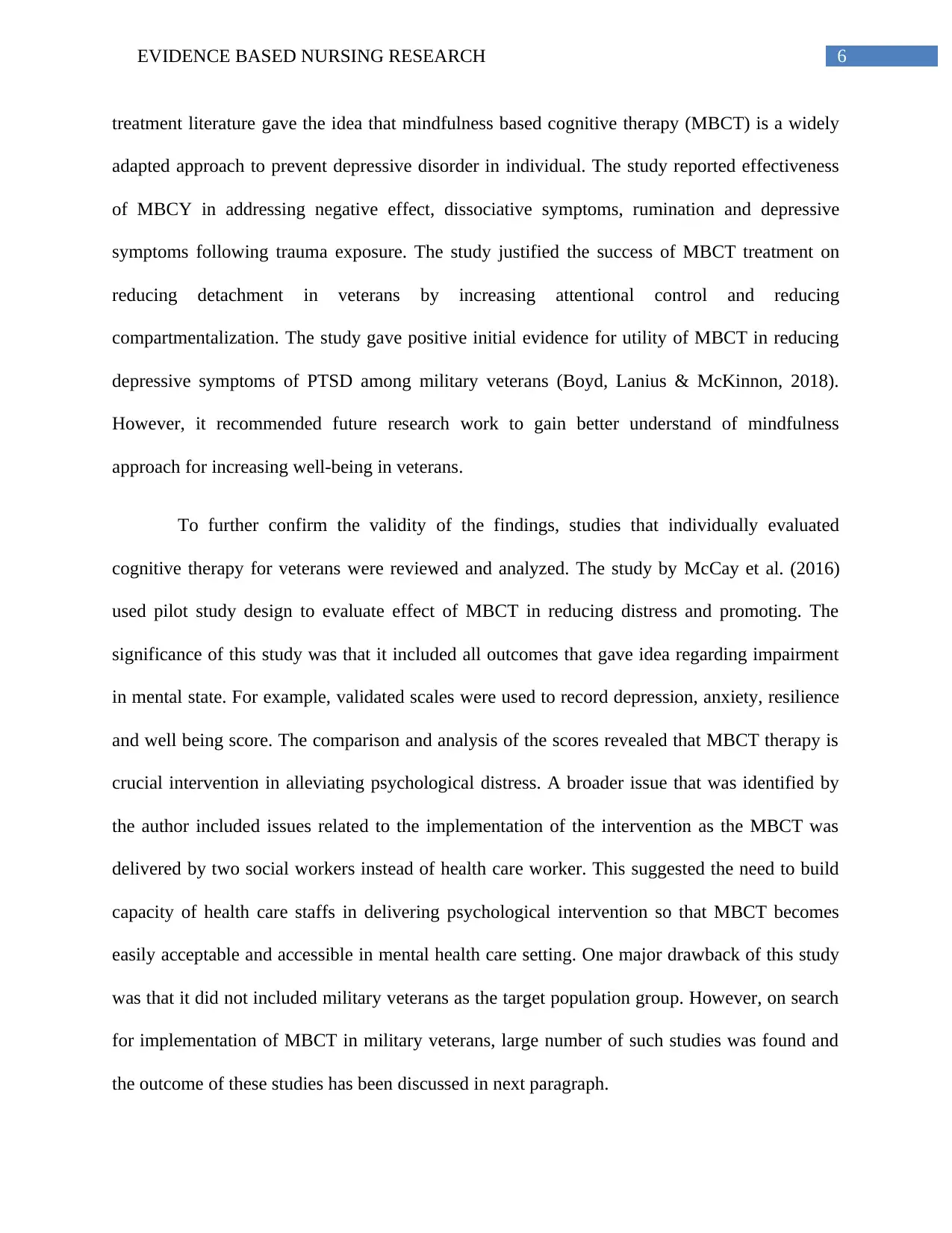
6EVIDENCE BASED NURSING RESEARCH
treatment literature gave the idea that mindfulness based cognitive therapy (MBCT) is a widely
adapted approach to prevent depressive disorder in individual. The study reported effectiveness
of MBCY in addressing negative effect, dissociative symptoms, rumination and depressive
symptoms following trauma exposure. The study justified the success of MBCT treatment on
reducing detachment in veterans by increasing attentional control and reducing
compartmentalization. The study gave positive initial evidence for utility of MBCT in reducing
depressive symptoms of PTSD among military veterans (Boyd, Lanius & McKinnon, 2018).
However, it recommended future research work to gain better understand of mindfulness
approach for increasing well-being in veterans.
To further confirm the validity of the findings, studies that individually evaluated
cognitive therapy for veterans were reviewed and analyzed. The study by McCay et al. (2016)
used pilot study design to evaluate effect of MBCT in reducing distress and promoting. The
significance of this study was that it included all outcomes that gave idea regarding impairment
in mental state. For example, validated scales were used to record depression, anxiety, resilience
and well being score. The comparison and analysis of the scores revealed that MBCT therapy is
crucial intervention in alleviating psychological distress. A broader issue that was identified by
the author included issues related to the implementation of the intervention as the MBCT was
delivered by two social workers instead of health care worker. This suggested the need to build
capacity of health care staffs in delivering psychological intervention so that MBCT becomes
easily acceptable and accessible in mental health care setting. One major drawback of this study
was that it did not included military veterans as the target population group. However, on search
for implementation of MBCT in military veterans, large number of such studies was found and
the outcome of these studies has been discussed in next paragraph.
treatment literature gave the idea that mindfulness based cognitive therapy (MBCT) is a widely
adapted approach to prevent depressive disorder in individual. The study reported effectiveness
of MBCY in addressing negative effect, dissociative symptoms, rumination and depressive
symptoms following trauma exposure. The study justified the success of MBCT treatment on
reducing detachment in veterans by increasing attentional control and reducing
compartmentalization. The study gave positive initial evidence for utility of MBCT in reducing
depressive symptoms of PTSD among military veterans (Boyd, Lanius & McKinnon, 2018).
However, it recommended future research work to gain better understand of mindfulness
approach for increasing well-being in veterans.
To further confirm the validity of the findings, studies that individually evaluated
cognitive therapy for veterans were reviewed and analyzed. The study by McCay et al. (2016)
used pilot study design to evaluate effect of MBCT in reducing distress and promoting. The
significance of this study was that it included all outcomes that gave idea regarding impairment
in mental state. For example, validated scales were used to record depression, anxiety, resilience
and well being score. The comparison and analysis of the scores revealed that MBCT therapy is
crucial intervention in alleviating psychological distress. A broader issue that was identified by
the author included issues related to the implementation of the intervention as the MBCT was
delivered by two social workers instead of health care worker. This suggested the need to build
capacity of health care staffs in delivering psychological intervention so that MBCT becomes
easily acceptable and accessible in mental health care setting. One major drawback of this study
was that it did not included military veterans as the target population group. However, on search
for implementation of MBCT in military veterans, large number of such studies was found and
the outcome of these studies has been discussed in next paragraph.
Paraphrase This Document
Need a fresh take? Get an instant paraphrase of this document with our AI Paraphraser
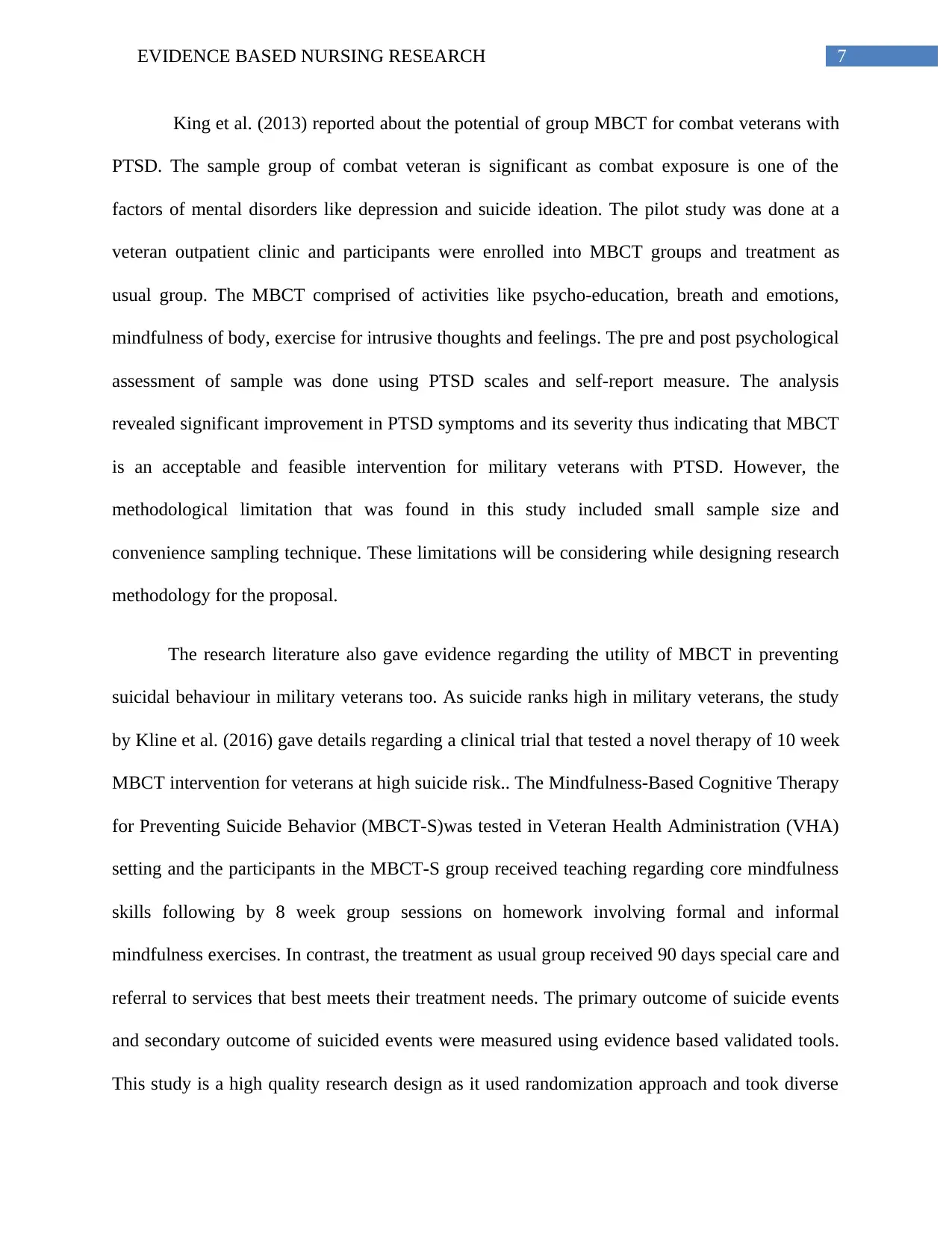
7EVIDENCE BASED NURSING RESEARCH
King et al. (2013) reported about the potential of group MBCT for combat veterans with
PTSD. The sample group of combat veteran is significant as combat exposure is one of the
factors of mental disorders like depression and suicide ideation. The pilot study was done at a
veteran outpatient clinic and participants were enrolled into MBCT groups and treatment as
usual group. The MBCT comprised of activities like psycho-education, breath and emotions,
mindfulness of body, exercise for intrusive thoughts and feelings. The pre and post psychological
assessment of sample was done using PTSD scales and self-report measure. The analysis
revealed significant improvement in PTSD symptoms and its severity thus indicating that MBCT
is an acceptable and feasible intervention for military veterans with PTSD. However, the
methodological limitation that was found in this study included small sample size and
convenience sampling technique. These limitations will be considering while designing research
methodology for the proposal.
The research literature also gave evidence regarding the utility of MBCT in preventing
suicidal behaviour in military veterans too. As suicide ranks high in military veterans, the study
by Kline et al. (2016) gave details regarding a clinical trial that tested a novel therapy of 10 week
MBCT intervention for veterans at high suicide risk.. The Mindfulness-Based Cognitive Therapy
for Preventing Suicide Behavior (MBCT-S)was tested in Veteran Health Administration (VHA)
setting and the participants in the MBCT-S group received teaching regarding core mindfulness
skills following by 8 week group sessions on homework involving formal and informal
mindfulness exercises. In contrast, the treatment as usual group received 90 days special care and
referral to services that best meets their treatment needs. The primary outcome of suicide events
and secondary outcome of suicided events were measured using evidence based validated tools.
This study is a high quality research design as it used randomization approach and took diverse
King et al. (2013) reported about the potential of group MBCT for combat veterans with
PTSD. The sample group of combat veteran is significant as combat exposure is one of the
factors of mental disorders like depression and suicide ideation. The pilot study was done at a
veteran outpatient clinic and participants were enrolled into MBCT groups and treatment as
usual group. The MBCT comprised of activities like psycho-education, breath and emotions,
mindfulness of body, exercise for intrusive thoughts and feelings. The pre and post psychological
assessment of sample was done using PTSD scales and self-report measure. The analysis
revealed significant improvement in PTSD symptoms and its severity thus indicating that MBCT
is an acceptable and feasible intervention for military veterans with PTSD. However, the
methodological limitation that was found in this study included small sample size and
convenience sampling technique. These limitations will be considering while designing research
methodology for the proposal.
The research literature also gave evidence regarding the utility of MBCT in preventing
suicidal behaviour in military veterans too. As suicide ranks high in military veterans, the study
by Kline et al. (2016) gave details regarding a clinical trial that tested a novel therapy of 10 week
MBCT intervention for veterans at high suicide risk.. The Mindfulness-Based Cognitive Therapy
for Preventing Suicide Behavior (MBCT-S)was tested in Veteran Health Administration (VHA)
setting and the participants in the MBCT-S group received teaching regarding core mindfulness
skills following by 8 week group sessions on homework involving formal and informal
mindfulness exercises. In contrast, the treatment as usual group received 90 days special care and
referral to services that best meets their treatment needs. The primary outcome of suicide events
and secondary outcome of suicided events were measured using evidence based validated tools.
This study is a high quality research design as it used randomization approach and took diverse
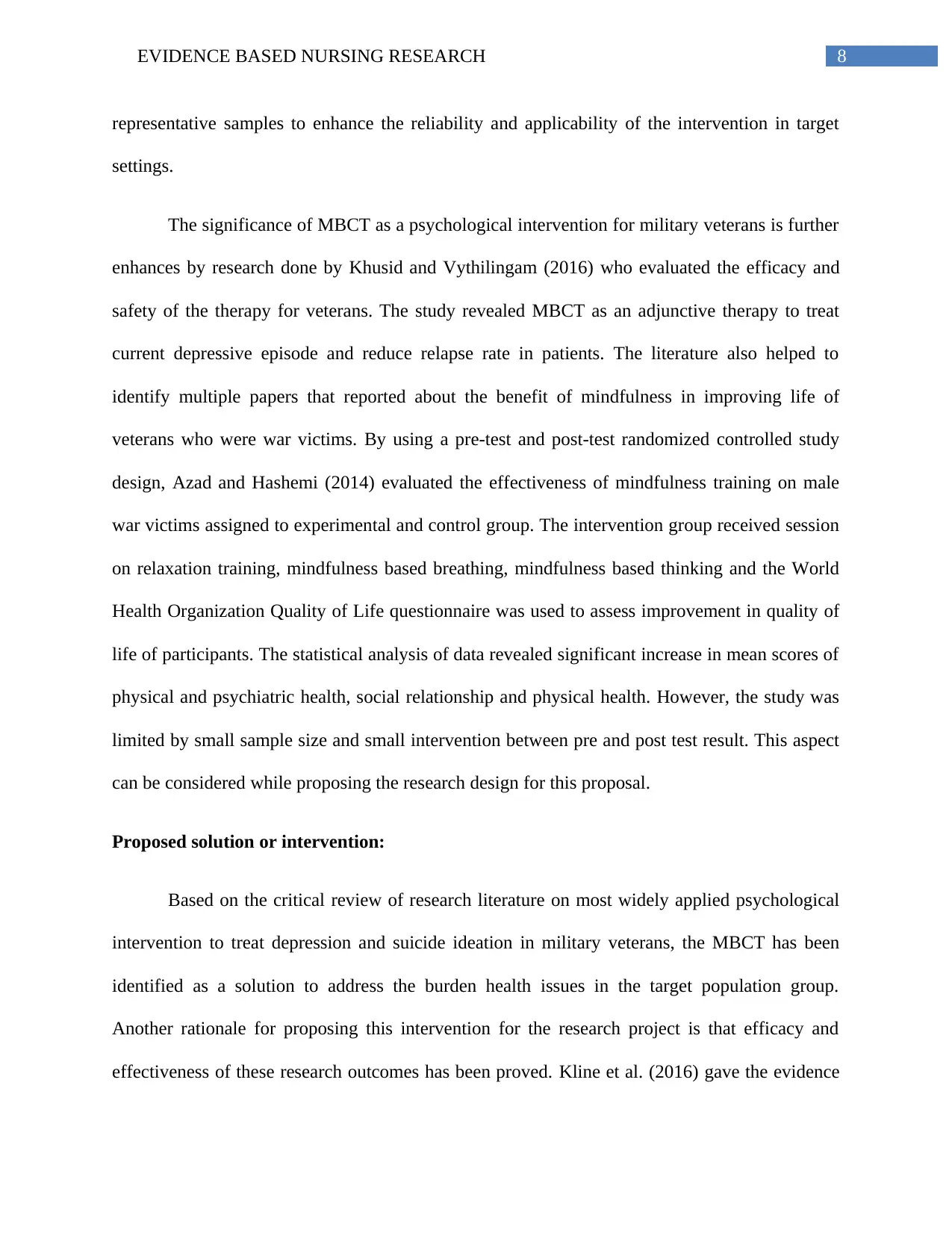
8EVIDENCE BASED NURSING RESEARCH
representative samples to enhance the reliability and applicability of the intervention in target
settings.
The significance of MBCT as a psychological intervention for military veterans is further
enhances by research done by Khusid and Vythilingam (2016) who evaluated the efficacy and
safety of the therapy for veterans. The study revealed MBCT as an adjunctive therapy to treat
current depressive episode and reduce relapse rate in patients. The literature also helped to
identify multiple papers that reported about the benefit of mindfulness in improving life of
veterans who were war victims. By using a pre-test and post-test randomized controlled study
design, Azad and Hashemi (2014) evaluated the effectiveness of mindfulness training on male
war victims assigned to experimental and control group. The intervention group received session
on relaxation training, mindfulness based breathing, mindfulness based thinking and the World
Health Organization Quality of Life questionnaire was used to assess improvement in quality of
life of participants. The statistical analysis of data revealed significant increase in mean scores of
physical and psychiatric health, social relationship and physical health. However, the study was
limited by small sample size and small intervention between pre and post test result. This aspect
can be considered while proposing the research design for this proposal.
Proposed solution or intervention:
Based on the critical review of research literature on most widely applied psychological
intervention to treat depression and suicide ideation in military veterans, the MBCT has been
identified as a solution to address the burden health issues in the target population group.
Another rationale for proposing this intervention for the research project is that efficacy and
effectiveness of these research outcomes has been proved. Kline et al. (2016) gave the evidence
representative samples to enhance the reliability and applicability of the intervention in target
settings.
The significance of MBCT as a psychological intervention for military veterans is further
enhances by research done by Khusid and Vythilingam (2016) who evaluated the efficacy and
safety of the therapy for veterans. The study revealed MBCT as an adjunctive therapy to treat
current depressive episode and reduce relapse rate in patients. The literature also helped to
identify multiple papers that reported about the benefit of mindfulness in improving life of
veterans who were war victims. By using a pre-test and post-test randomized controlled study
design, Azad and Hashemi (2014) evaluated the effectiveness of mindfulness training on male
war victims assigned to experimental and control group. The intervention group received session
on relaxation training, mindfulness based breathing, mindfulness based thinking and the World
Health Organization Quality of Life questionnaire was used to assess improvement in quality of
life of participants. The statistical analysis of data revealed significant increase in mean scores of
physical and psychiatric health, social relationship and physical health. However, the study was
limited by small sample size and small intervention between pre and post test result. This aspect
can be considered while proposing the research design for this proposal.
Proposed solution or intervention:
Based on the critical review of research literature on most widely applied psychological
intervention to treat depression and suicide ideation in military veterans, the MBCT has been
identified as a solution to address the burden health issues in the target population group.
Another rationale for proposing this intervention for the research project is that efficacy and
effectiveness of these research outcomes has been proved. Kline et al. (2016) gave the evidence
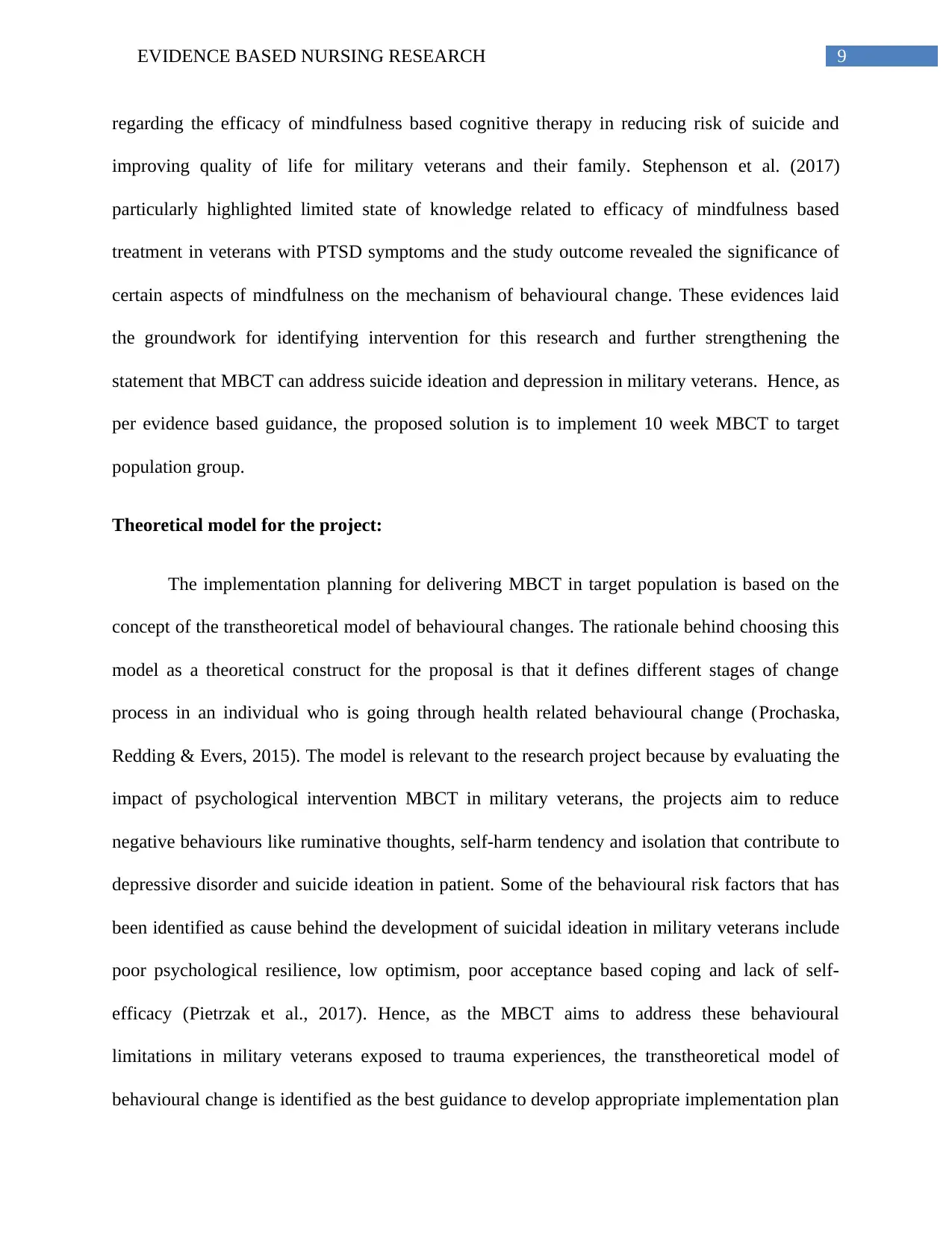
9EVIDENCE BASED NURSING RESEARCH
regarding the efficacy of mindfulness based cognitive therapy in reducing risk of suicide and
improving quality of life for military veterans and their family. Stephenson et al. (2017)
particularly highlighted limited state of knowledge related to efficacy of mindfulness based
treatment in veterans with PTSD symptoms and the study outcome revealed the significance of
certain aspects of mindfulness on the mechanism of behavioural change. These evidences laid
the groundwork for identifying intervention for this research and further strengthening the
statement that MBCT can address suicide ideation and depression in military veterans. Hence, as
per evidence based guidance, the proposed solution is to implement 10 week MBCT to target
population group.
Theoretical model for the project:
The implementation planning for delivering MBCT in target population is based on the
concept of the transtheoretical model of behavioural changes. The rationale behind choosing this
model as a theoretical construct for the proposal is that it defines different stages of change
process in an individual who is going through health related behavioural change (Prochaska,
Redding & Evers, 2015). The model is relevant to the research project because by evaluating the
impact of psychological intervention MBCT in military veterans, the projects aim to reduce
negative behaviours like ruminative thoughts, self-harm tendency and isolation that contribute to
depressive disorder and suicide ideation in patient. Some of the behavioural risk factors that has
been identified as cause behind the development of suicidal ideation in military veterans include
poor psychological resilience, low optimism, poor acceptance based coping and lack of self-
efficacy (Pietrzak et al., 2017). Hence, as the MBCT aims to address these behavioural
limitations in military veterans exposed to trauma experiences, the transtheoretical model of
behavioural change is identified as the best guidance to develop appropriate implementation plan
regarding the efficacy of mindfulness based cognitive therapy in reducing risk of suicide and
improving quality of life for military veterans and their family. Stephenson et al. (2017)
particularly highlighted limited state of knowledge related to efficacy of mindfulness based
treatment in veterans with PTSD symptoms and the study outcome revealed the significance of
certain aspects of mindfulness on the mechanism of behavioural change. These evidences laid
the groundwork for identifying intervention for this research and further strengthening the
statement that MBCT can address suicide ideation and depression in military veterans. Hence, as
per evidence based guidance, the proposed solution is to implement 10 week MBCT to target
population group.
Theoretical model for the project:
The implementation planning for delivering MBCT in target population is based on the
concept of the transtheoretical model of behavioural changes. The rationale behind choosing this
model as a theoretical construct for the proposal is that it defines different stages of change
process in an individual who is going through health related behavioural change (Prochaska,
Redding & Evers, 2015). The model is relevant to the research project because by evaluating the
impact of psychological intervention MBCT in military veterans, the projects aim to reduce
negative behaviours like ruminative thoughts, self-harm tendency and isolation that contribute to
depressive disorder and suicide ideation in patient. Some of the behavioural risk factors that has
been identified as cause behind the development of suicidal ideation in military veterans include
poor psychological resilience, low optimism, poor acceptance based coping and lack of self-
efficacy (Pietrzak et al., 2017). Hence, as the MBCT aims to address these behavioural
limitations in military veterans exposed to trauma experiences, the transtheoretical model of
behavioural change is identified as the best guidance to develop appropriate implementation plan
Secure Best Marks with AI Grader
Need help grading? Try our AI Grader for instant feedback on your assignments.
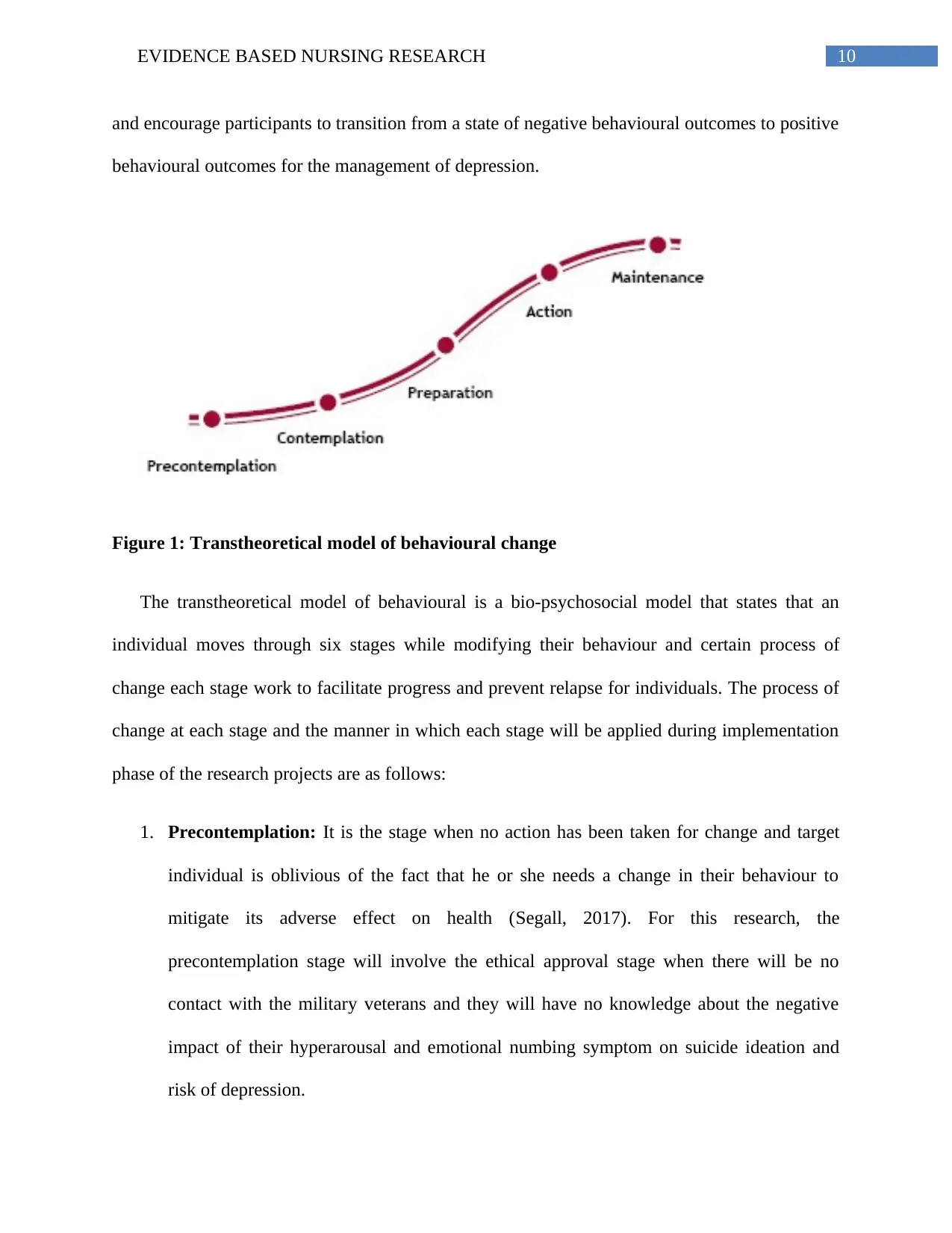
10EVIDENCE BASED NURSING RESEARCH
and encourage participants to transition from a state of negative behavioural outcomes to positive
behavioural outcomes for the management of depression.
Figure 1: Transtheoretical model of behavioural change
The transtheoretical model of behavioural is a bio-psychosocial model that states that an
individual moves through six stages while modifying their behaviour and certain process of
change each stage work to facilitate progress and prevent relapse for individuals. The process of
change at each stage and the manner in which each stage will be applied during implementation
phase of the research projects are as follows:
1. Precontemplation: It is the stage when no action has been taken for change and target
individual is oblivious of the fact that he or she needs a change in their behaviour to
mitigate its adverse effect on health (Segall, 2017). For this research, the
precontemplation stage will involve the ethical approval stage when there will be no
contact with the military veterans and they will have no knowledge about the negative
impact of their hyperarousal and emotional numbing symptom on suicide ideation and
risk of depression.
and encourage participants to transition from a state of negative behavioural outcomes to positive
behavioural outcomes for the management of depression.
Figure 1: Transtheoretical model of behavioural change
The transtheoretical model of behavioural is a bio-psychosocial model that states that an
individual moves through six stages while modifying their behaviour and certain process of
change each stage work to facilitate progress and prevent relapse for individuals. The process of
change at each stage and the manner in which each stage will be applied during implementation
phase of the research projects are as follows:
1. Precontemplation: It is the stage when no action has been taken for change and target
individual is oblivious of the fact that he or she needs a change in their behaviour to
mitigate its adverse effect on health (Segall, 2017). For this research, the
precontemplation stage will involve the ethical approval stage when there will be no
contact with the military veterans and they will have no knowledge about the negative
impact of their hyperarousal and emotional numbing symptom on suicide ideation and
risk of depression.
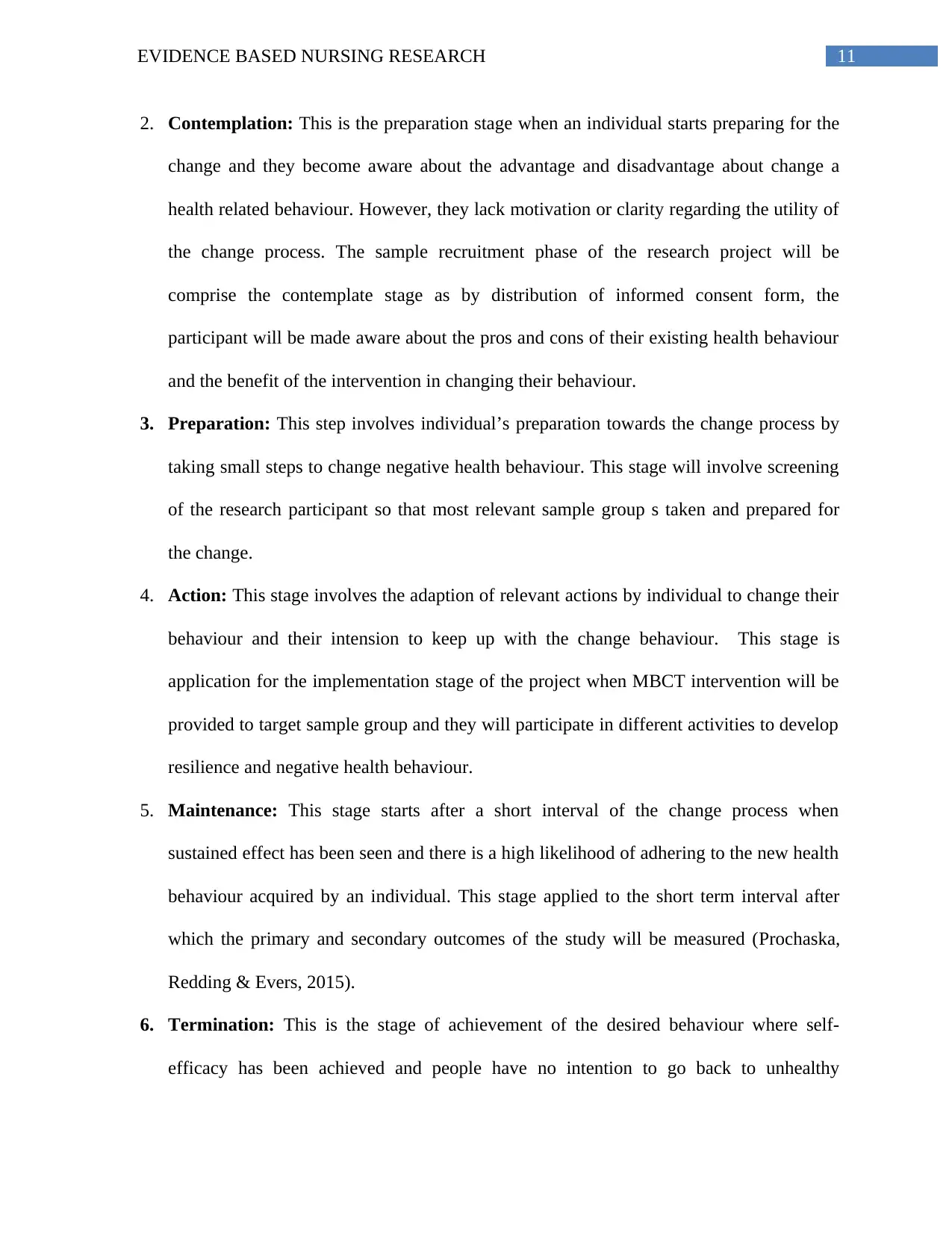
11EVIDENCE BASED NURSING RESEARCH
2. Contemplation: This is the preparation stage when an individual starts preparing for the
change and they become aware about the advantage and disadvantage about change a
health related behaviour. However, they lack motivation or clarity regarding the utility of
the change process. The sample recruitment phase of the research project will be
comprise the contemplate stage as by distribution of informed consent form, the
participant will be made aware about the pros and cons of their existing health behaviour
and the benefit of the intervention in changing their behaviour.
3. Preparation: This step involves individual’s preparation towards the change process by
taking small steps to change negative health behaviour. This stage will involve screening
of the research participant so that most relevant sample group s taken and prepared for
the change.
4. Action: This stage involves the adaption of relevant actions by individual to change their
behaviour and their intension to keep up with the change behaviour. This stage is
application for the implementation stage of the project when MBCT intervention will be
provided to target sample group and they will participate in different activities to develop
resilience and negative health behaviour.
5. Maintenance: This stage starts after a short interval of the change process when
sustained effect has been seen and there is a high likelihood of adhering to the new health
behaviour acquired by an individual. This stage applied to the short term interval after
which the primary and secondary outcomes of the study will be measured (Prochaska,
Redding & Evers, 2015).
6. Termination: This is the stage of achievement of the desired behaviour where self-
efficacy has been achieved and people have no intention to go back to unhealthy
2. Contemplation: This is the preparation stage when an individual starts preparing for the
change and they become aware about the advantage and disadvantage about change a
health related behaviour. However, they lack motivation or clarity regarding the utility of
the change process. The sample recruitment phase of the research project will be
comprise the contemplate stage as by distribution of informed consent form, the
participant will be made aware about the pros and cons of their existing health behaviour
and the benefit of the intervention in changing their behaviour.
3. Preparation: This step involves individual’s preparation towards the change process by
taking small steps to change negative health behaviour. This stage will involve screening
of the research participant so that most relevant sample group s taken and prepared for
the change.
4. Action: This stage involves the adaption of relevant actions by individual to change their
behaviour and their intension to keep up with the change behaviour. This stage is
application for the implementation stage of the project when MBCT intervention will be
provided to target sample group and they will participate in different activities to develop
resilience and negative health behaviour.
5. Maintenance: This stage starts after a short interval of the change process when
sustained effect has been seen and there is a high likelihood of adhering to the new health
behaviour acquired by an individual. This stage applied to the short term interval after
which the primary and secondary outcomes of the study will be measured (Prochaska,
Redding & Evers, 2015).
6. Termination: This is the stage of achievement of the desired behaviour where self-
efficacy has been achieved and people have no intention to go back to unhealthy
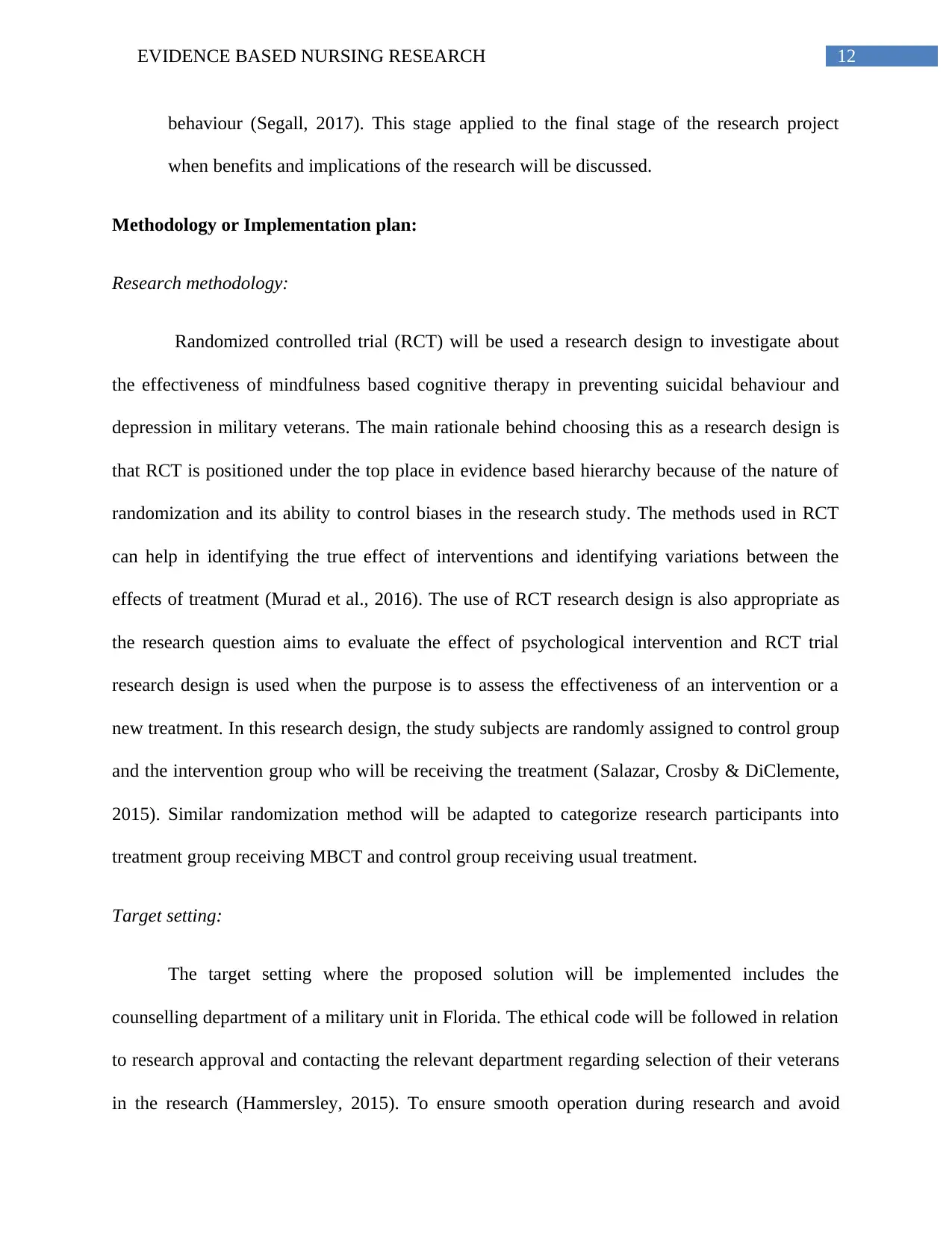
12EVIDENCE BASED NURSING RESEARCH
behaviour (Segall, 2017). This stage applied to the final stage of the research project
when benefits and implications of the research will be discussed.
Methodology or Implementation plan:
Research methodology:
Randomized controlled trial (RCT) will be used a research design to investigate about
the effectiveness of mindfulness based cognitive therapy in preventing suicidal behaviour and
depression in military veterans. The main rationale behind choosing this as a research design is
that RCT is positioned under the top place in evidence based hierarchy because of the nature of
randomization and its ability to control biases in the research study. The methods used in RCT
can help in identifying the true effect of interventions and identifying variations between the
effects of treatment (Murad et al., 2016). The use of RCT research design is also appropriate as
the research question aims to evaluate the effect of psychological intervention and RCT trial
research design is used when the purpose is to assess the effectiveness of an intervention or a
new treatment. In this research design, the study subjects are randomly assigned to control group
and the intervention group who will be receiving the treatment (Salazar, Crosby & DiClemente,
2015). Similar randomization method will be adapted to categorize research participants into
treatment group receiving MBCT and control group receiving usual treatment.
Target setting:
The target setting where the proposed solution will be implemented includes the
counselling department of a military unit in Florida. The ethical code will be followed in relation
to research approval and contacting the relevant department regarding selection of their veterans
in the research (Hammersley, 2015). To ensure smooth operation during research and avoid
behaviour (Segall, 2017). This stage applied to the final stage of the research project
when benefits and implications of the research will be discussed.
Methodology or Implementation plan:
Research methodology:
Randomized controlled trial (RCT) will be used a research design to investigate about
the effectiveness of mindfulness based cognitive therapy in preventing suicidal behaviour and
depression in military veterans. The main rationale behind choosing this as a research design is
that RCT is positioned under the top place in evidence based hierarchy because of the nature of
randomization and its ability to control biases in the research study. The methods used in RCT
can help in identifying the true effect of interventions and identifying variations between the
effects of treatment (Murad et al., 2016). The use of RCT research design is also appropriate as
the research question aims to evaluate the effect of psychological intervention and RCT trial
research design is used when the purpose is to assess the effectiveness of an intervention or a
new treatment. In this research design, the study subjects are randomly assigned to control group
and the intervention group who will be receiving the treatment (Salazar, Crosby & DiClemente,
2015). Similar randomization method will be adapted to categorize research participants into
treatment group receiving MBCT and control group receiving usual treatment.
Target setting:
The target setting where the proposed solution will be implemented includes the
counselling department of a military unit in Florida. The ethical code will be followed in relation
to research approval and contacting the relevant department regarding selection of their veterans
in the research (Hammersley, 2015). To ensure smooth operation during research and avoid
Paraphrase This Document
Need a fresh take? Get an instant paraphrase of this document with our AI Paraphraser
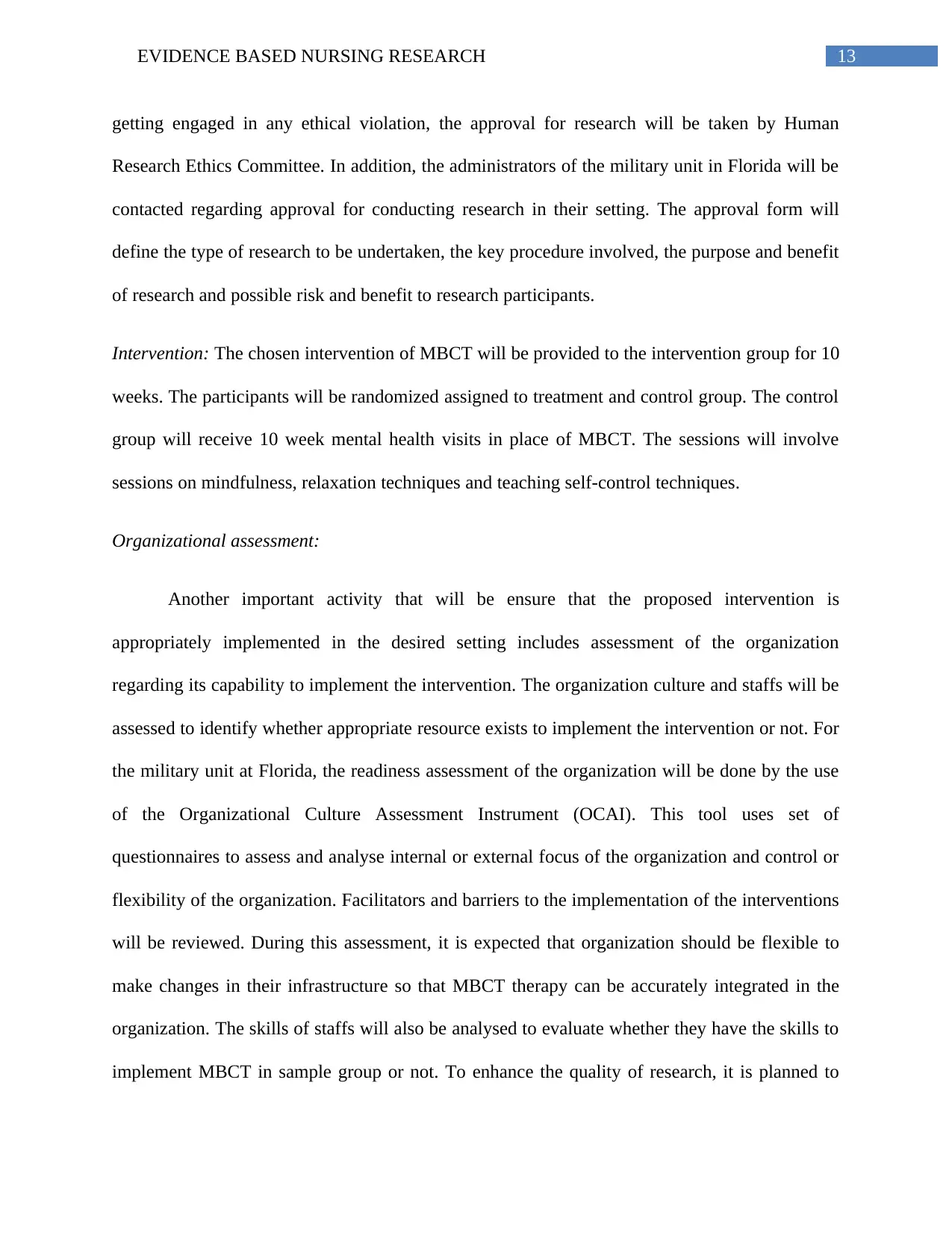
13EVIDENCE BASED NURSING RESEARCH
getting engaged in any ethical violation, the approval for research will be taken by Human
Research Ethics Committee. In addition, the administrators of the military unit in Florida will be
contacted regarding approval for conducting research in their setting. The approval form will
define the type of research to be undertaken, the key procedure involved, the purpose and benefit
of research and possible risk and benefit to research participants.
Intervention: The chosen intervention of MBCT will be provided to the intervention group for 10
weeks. The participants will be randomized assigned to treatment and control group. The control
group will receive 10 week mental health visits in place of MBCT. The sessions will involve
sessions on mindfulness, relaxation techniques and teaching self-control techniques.
Organizational assessment:
Another important activity that will be ensure that the proposed intervention is
appropriately implemented in the desired setting includes assessment of the organization
regarding its capability to implement the intervention. The organization culture and staffs will be
assessed to identify whether appropriate resource exists to implement the intervention or not. For
the military unit at Florida, the readiness assessment of the organization will be done by the use
of the Organizational Culture Assessment Instrument (OCAI). This tool uses set of
questionnaires to assess and analyse internal or external focus of the organization and control or
flexibility of the organization. Facilitators and barriers to the implementation of the interventions
will be reviewed. During this assessment, it is expected that organization should be flexible to
make changes in their infrastructure so that MBCT therapy can be accurately integrated in the
organization. The skills of staffs will also be analysed to evaluate whether they have the skills to
implement MBCT in sample group or not. To enhance the quality of research, it is planned to
getting engaged in any ethical violation, the approval for research will be taken by Human
Research Ethics Committee. In addition, the administrators of the military unit in Florida will be
contacted regarding approval for conducting research in their setting. The approval form will
define the type of research to be undertaken, the key procedure involved, the purpose and benefit
of research and possible risk and benefit to research participants.
Intervention: The chosen intervention of MBCT will be provided to the intervention group for 10
weeks. The participants will be randomized assigned to treatment and control group. The control
group will receive 10 week mental health visits in place of MBCT. The sessions will involve
sessions on mindfulness, relaxation techniques and teaching self-control techniques.
Organizational assessment:
Another important activity that will be ensure that the proposed intervention is
appropriately implemented in the desired setting includes assessment of the organization
regarding its capability to implement the intervention. The organization culture and staffs will be
assessed to identify whether appropriate resource exists to implement the intervention or not. For
the military unit at Florida, the readiness assessment of the organization will be done by the use
of the Organizational Culture Assessment Instrument (OCAI). This tool uses set of
questionnaires to assess and analyse internal or external focus of the organization and control or
flexibility of the organization. Facilitators and barriers to the implementation of the interventions
will be reviewed. During this assessment, it is expected that organization should be flexible to
make changes in their infrastructure so that MBCT therapy can be accurately integrated in the
organization. The skills of staffs will also be analysed to evaluate whether they have the skills to
implement MBCT in sample group or not. To enhance the quality of research, it is planned to
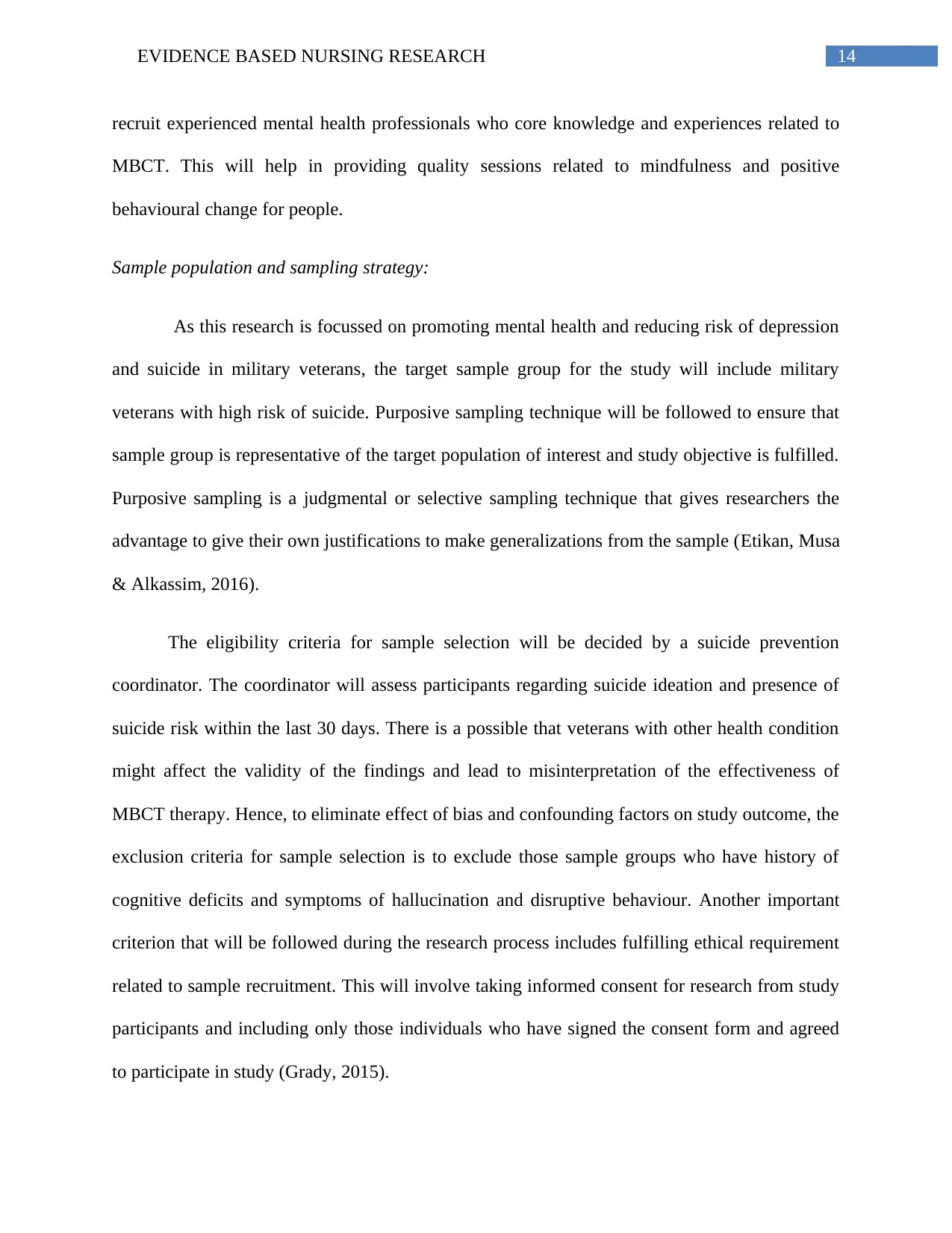
14EVIDENCE BASED NURSING RESEARCH
recruit experienced mental health professionals who core knowledge and experiences related to
MBCT. This will help in providing quality sessions related to mindfulness and positive
behavioural change for people.
Sample population and sampling strategy:
As this research is focussed on promoting mental health and reducing risk of depression
and suicide in military veterans, the target sample group for the study will include military
veterans with high risk of suicide. Purposive sampling technique will be followed to ensure that
sample group is representative of the target population of interest and study objective is fulfilled.
Purposive sampling is a judgmental or selective sampling technique that gives researchers the
advantage to give their own justifications to make generalizations from the sample (Etikan, Musa
& Alkassim, 2016).
The eligibility criteria for sample selection will be decided by a suicide prevention
coordinator. The coordinator will assess participants regarding suicide ideation and presence of
suicide risk within the last 30 days. There is a possible that veterans with other health condition
might affect the validity of the findings and lead to misinterpretation of the effectiveness of
MBCT therapy. Hence, to eliminate effect of bias and confounding factors on study outcome, the
exclusion criteria for sample selection is to exclude those sample groups who have history of
cognitive deficits and symptoms of hallucination and disruptive behaviour. Another important
criterion that will be followed during the research process includes fulfilling ethical requirement
related to sample recruitment. This will involve taking informed consent for research from study
participants and including only those individuals who have signed the consent form and agreed
to participate in study (Grady, 2015).
recruit experienced mental health professionals who core knowledge and experiences related to
MBCT. This will help in providing quality sessions related to mindfulness and positive
behavioural change for people.
Sample population and sampling strategy:
As this research is focussed on promoting mental health and reducing risk of depression
and suicide in military veterans, the target sample group for the study will include military
veterans with high risk of suicide. Purposive sampling technique will be followed to ensure that
sample group is representative of the target population of interest and study objective is fulfilled.
Purposive sampling is a judgmental or selective sampling technique that gives researchers the
advantage to give their own justifications to make generalizations from the sample (Etikan, Musa
& Alkassim, 2016).
The eligibility criteria for sample selection will be decided by a suicide prevention
coordinator. The coordinator will assess participants regarding suicide ideation and presence of
suicide risk within the last 30 days. There is a possible that veterans with other health condition
might affect the validity of the findings and lead to misinterpretation of the effectiveness of
MBCT therapy. Hence, to eliminate effect of bias and confounding factors on study outcome, the
exclusion criteria for sample selection is to exclude those sample groups who have history of
cognitive deficits and symptoms of hallucination and disruptive behaviour. Another important
criterion that will be followed during the research process includes fulfilling ethical requirement
related to sample recruitment. This will involve taking informed consent for research from study
participants and including only those individuals who have signed the consent form and agreed
to participate in study (Grady, 2015).
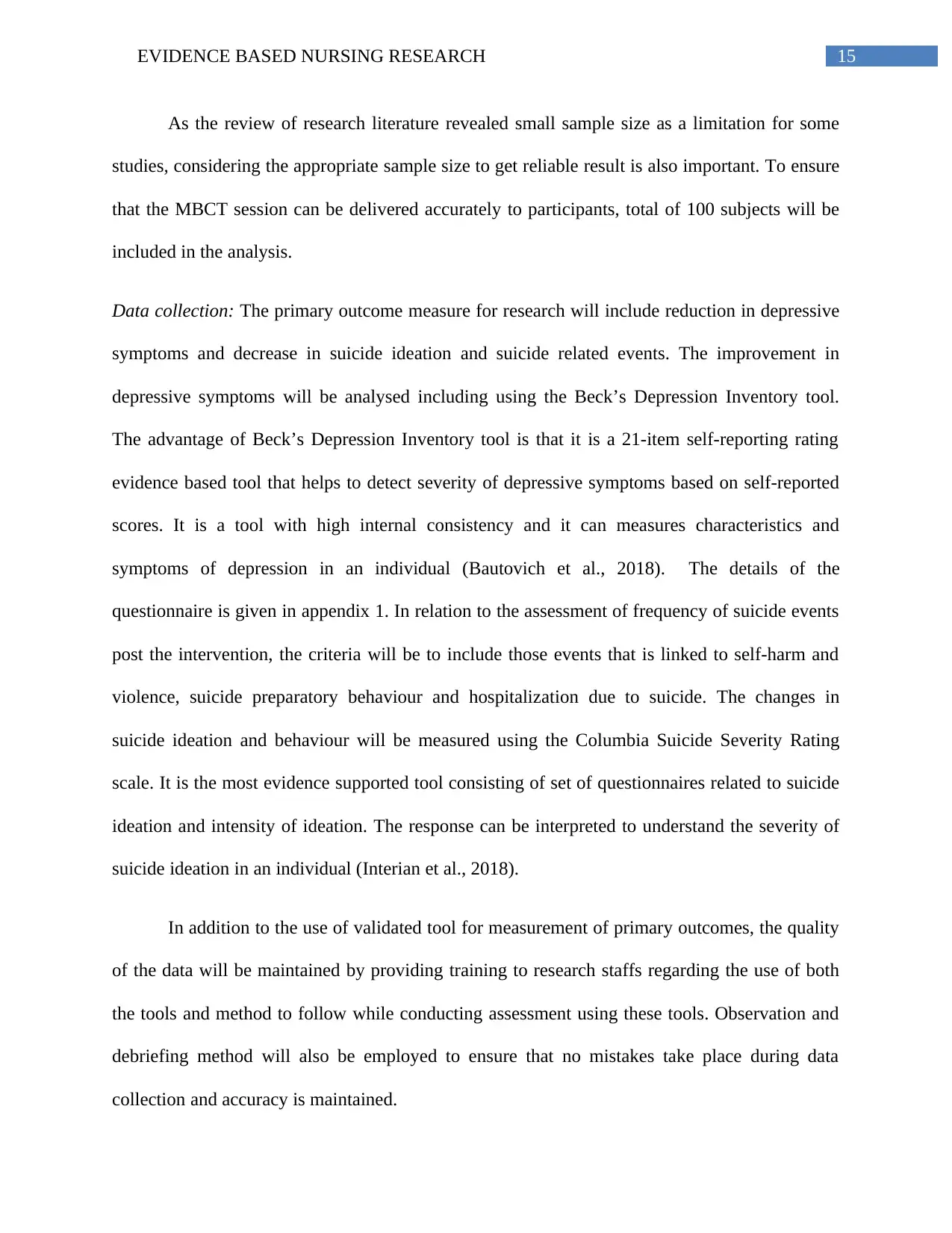
15EVIDENCE BASED NURSING RESEARCH
As the review of research literature revealed small sample size as a limitation for some
studies, considering the appropriate sample size to get reliable result is also important. To ensure
that the MBCT session can be delivered accurately to participants, total of 100 subjects will be
included in the analysis.
Data collection: The primary outcome measure for research will include reduction in depressive
symptoms and decrease in suicide ideation and suicide related events. The improvement in
depressive symptoms will be analysed including using the Beck’s Depression Inventory tool.
The advantage of Beck’s Depression Inventory tool is that it is a 21-item self-reporting rating
evidence based tool that helps to detect severity of depressive symptoms based on self-reported
scores. It is a tool with high internal consistency and it can measures characteristics and
symptoms of depression in an individual (Bautovich et al., 2018). The details of the
questionnaire is given in appendix 1. In relation to the assessment of frequency of suicide events
post the intervention, the criteria will be to include those events that is linked to self-harm and
violence, suicide preparatory behaviour and hospitalization due to suicide. The changes in
suicide ideation and behaviour will be measured using the Columbia Suicide Severity Rating
scale. It is the most evidence supported tool consisting of set of questionnaires related to suicide
ideation and intensity of ideation. The response can be interpreted to understand the severity of
suicide ideation in an individual (Interian et al., 2018).
In addition to the use of validated tool for measurement of primary outcomes, the quality
of the data will be maintained by providing training to research staffs regarding the use of both
the tools and method to follow while conducting assessment using these tools. Observation and
debriefing method will also be employed to ensure that no mistakes take place during data
collection and accuracy is maintained.
As the review of research literature revealed small sample size as a limitation for some
studies, considering the appropriate sample size to get reliable result is also important. To ensure
that the MBCT session can be delivered accurately to participants, total of 100 subjects will be
included in the analysis.
Data collection: The primary outcome measure for research will include reduction in depressive
symptoms and decrease in suicide ideation and suicide related events. The improvement in
depressive symptoms will be analysed including using the Beck’s Depression Inventory tool.
The advantage of Beck’s Depression Inventory tool is that it is a 21-item self-reporting rating
evidence based tool that helps to detect severity of depressive symptoms based on self-reported
scores. It is a tool with high internal consistency and it can measures characteristics and
symptoms of depression in an individual (Bautovich et al., 2018). The details of the
questionnaire is given in appendix 1. In relation to the assessment of frequency of suicide events
post the intervention, the criteria will be to include those events that is linked to self-harm and
violence, suicide preparatory behaviour and hospitalization due to suicide. The changes in
suicide ideation and behaviour will be measured using the Columbia Suicide Severity Rating
scale. It is the most evidence supported tool consisting of set of questionnaires related to suicide
ideation and intensity of ideation. The response can be interpreted to understand the severity of
suicide ideation in an individual (Interian et al., 2018).
In addition to the use of validated tool for measurement of primary outcomes, the quality
of the data will be maintained by providing training to research staffs regarding the use of both
the tools and method to follow while conducting assessment using these tools. Observation and
debriefing method will also be employed to ensure that no mistakes take place during data
collection and accuracy is maintained.
Secure Best Marks with AI Grader
Need help grading? Try our AI Grader for instant feedback on your assignments.
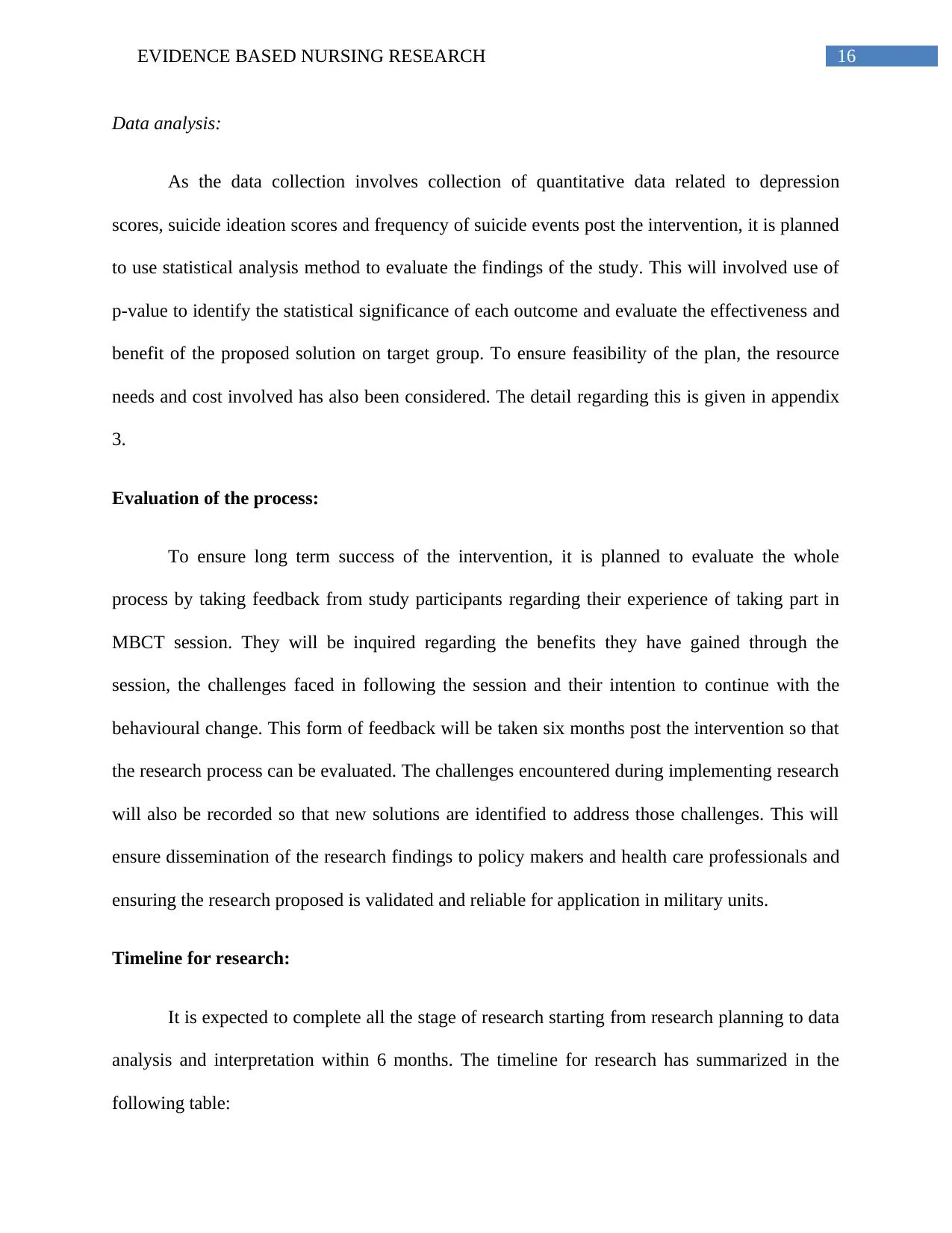
16EVIDENCE BASED NURSING RESEARCH
Data analysis:
As the data collection involves collection of quantitative data related to depression
scores, suicide ideation scores and frequency of suicide events post the intervention, it is planned
to use statistical analysis method to evaluate the findings of the study. This will involved use of
p-value to identify the statistical significance of each outcome and evaluate the effectiveness and
benefit of the proposed solution on target group. To ensure feasibility of the plan, the resource
needs and cost involved has also been considered. The detail regarding this is given in appendix
3.
Evaluation of the process:
To ensure long term success of the intervention, it is planned to evaluate the whole
process by taking feedback from study participants regarding their experience of taking part in
MBCT session. They will be inquired regarding the benefits they have gained through the
session, the challenges faced in following the session and their intention to continue with the
behavioural change. This form of feedback will be taken six months post the intervention so that
the research process can be evaluated. The challenges encountered during implementing research
will also be recorded so that new solutions are identified to address those challenges. This will
ensure dissemination of the research findings to policy makers and health care professionals and
ensuring the research proposed is validated and reliable for application in military units.
Timeline for research:
It is expected to complete all the stage of research starting from research planning to data
analysis and interpretation within 6 months. The timeline for research has summarized in the
following table:
Data analysis:
As the data collection involves collection of quantitative data related to depression
scores, suicide ideation scores and frequency of suicide events post the intervention, it is planned
to use statistical analysis method to evaluate the findings of the study. This will involved use of
p-value to identify the statistical significance of each outcome and evaluate the effectiveness and
benefit of the proposed solution on target group. To ensure feasibility of the plan, the resource
needs and cost involved has also been considered. The detail regarding this is given in appendix
3.
Evaluation of the process:
To ensure long term success of the intervention, it is planned to evaluate the whole
process by taking feedback from study participants regarding their experience of taking part in
MBCT session. They will be inquired regarding the benefits they have gained through the
session, the challenges faced in following the session and their intention to continue with the
behavioural change. This form of feedback will be taken six months post the intervention so that
the research process can be evaluated. The challenges encountered during implementing research
will also be recorded so that new solutions are identified to address those challenges. This will
ensure dissemination of the research findings to policy makers and health care professionals and
ensuring the research proposed is validated and reliable for application in military units.
Timeline for research:
It is expected to complete all the stage of research starting from research planning to data
analysis and interpretation within 6 months. The timeline for research has summarized in the
following table:
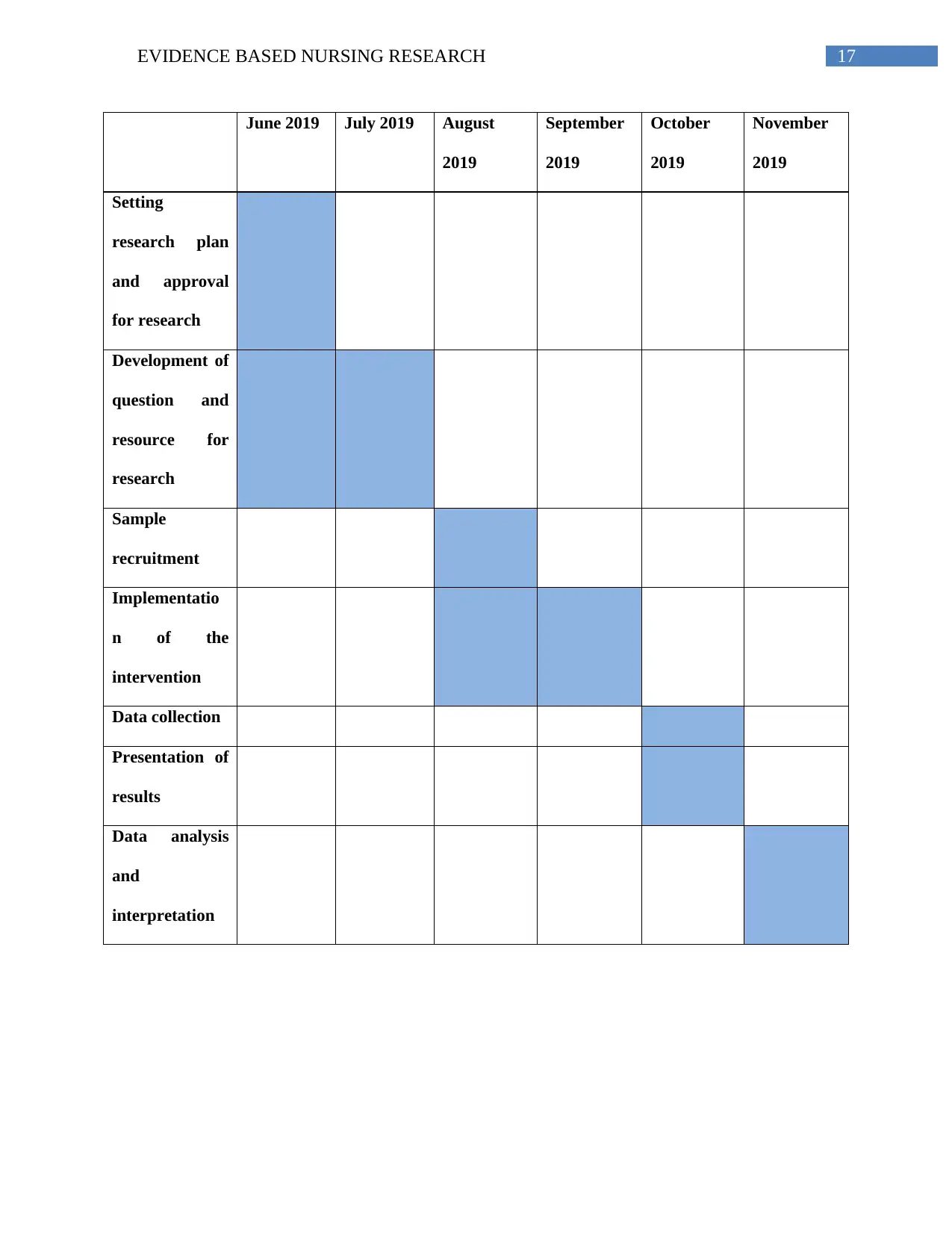
17EVIDENCE BASED NURSING RESEARCH
June 2019 July 2019 August
2019
September
2019
October
2019
November
2019
Setting
research plan
and approval
for research
Development of
question and
resource for
research
Sample
recruitment
Implementatio
n of the
intervention
Data collection
Presentation of
results
Data analysis
and
interpretation
June 2019 July 2019 August
2019
September
2019
October
2019
November
2019
Setting
research plan
and approval
for research
Development of
question and
resource for
research
Sample
recruitment
Implementatio
n of the
intervention
Data collection
Presentation of
results
Data analysis
and
interpretation
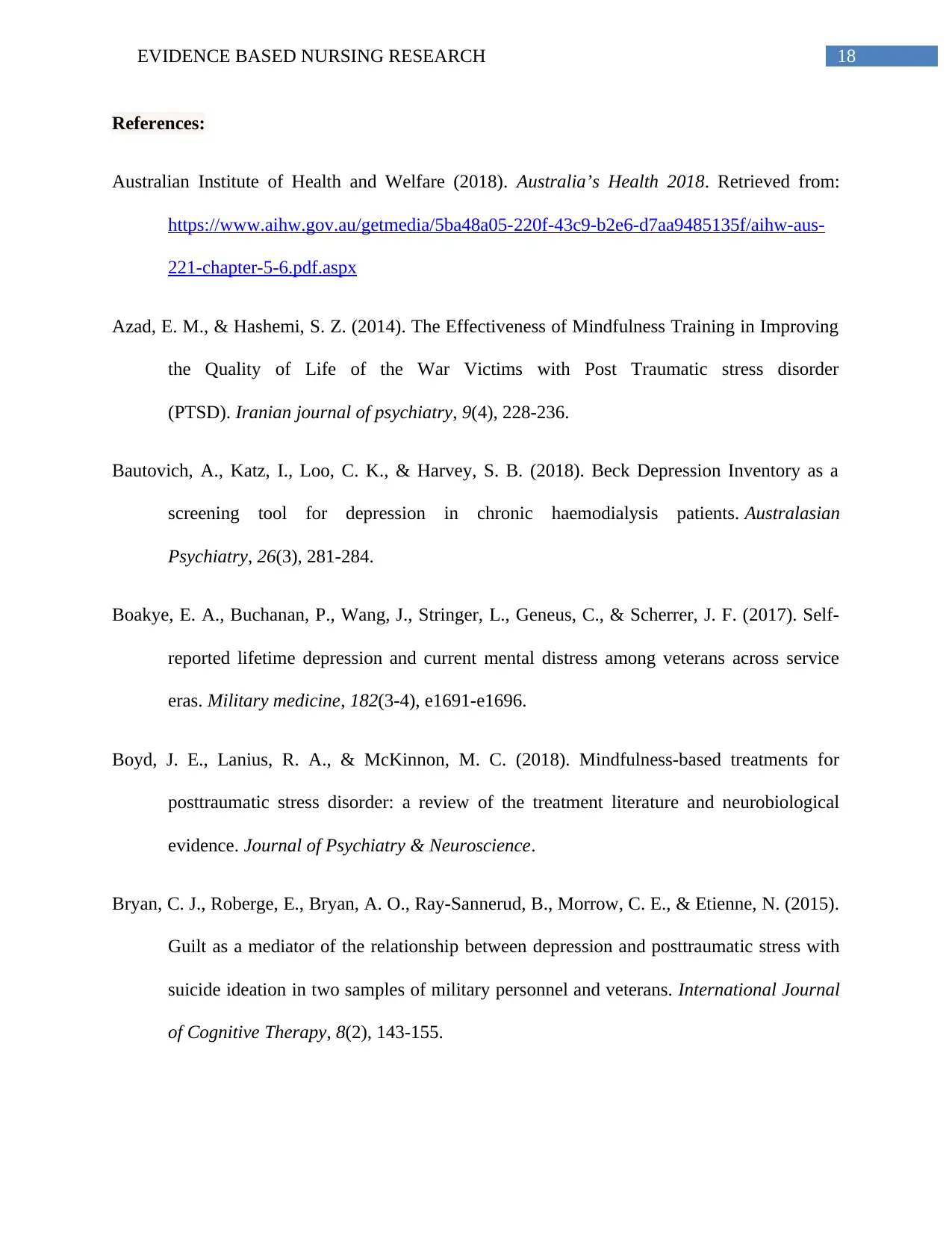
18EVIDENCE BASED NURSING RESEARCH
References:
Australian Institute of Health and Welfare (2018). Australia’s Health 2018. Retrieved from:
https://www.aihw.gov.au/getmedia/5ba48a05-220f-43c9-b2e6-d7aa9485135f/aihw-aus-
221-chapter-5-6.pdf.aspx
Azad, E. M., & Hashemi, S. Z. (2014). The Effectiveness of Mindfulness Training in Improving
the Quality of Life of the War Victims with Post Traumatic stress disorder
(PTSD). Iranian journal of psychiatry, 9(4), 228-236.
Bautovich, A., Katz, I., Loo, C. K., & Harvey, S. B. (2018). Beck Depression Inventory as a
screening tool for depression in chronic haemodialysis patients. Australasian
Psychiatry, 26(3), 281-284.
Boakye, E. A., Buchanan, P., Wang, J., Stringer, L., Geneus, C., & Scherrer, J. F. (2017). Self-
reported lifetime depression and current mental distress among veterans across service
eras. Military medicine, 182(3-4), e1691-e1696.
Boyd, J. E., Lanius, R. A., & McKinnon, M. C. (2018). Mindfulness-based treatments for
posttraumatic stress disorder: a review of the treatment literature and neurobiological
evidence. Journal of Psychiatry & Neuroscience.
Bryan, C. J., Roberge, E., Bryan, A. O., Ray-Sannerud, B., Morrow, C. E., & Etienne, N. (2015).
Guilt as a mediator of the relationship between depression and posttraumatic stress with
suicide ideation in two samples of military personnel and veterans. International Journal
of Cognitive Therapy, 8(2), 143-155.
References:
Australian Institute of Health and Welfare (2018). Australia’s Health 2018. Retrieved from:
https://www.aihw.gov.au/getmedia/5ba48a05-220f-43c9-b2e6-d7aa9485135f/aihw-aus-
221-chapter-5-6.pdf.aspx
Azad, E. M., & Hashemi, S. Z. (2014). The Effectiveness of Mindfulness Training in Improving
the Quality of Life of the War Victims with Post Traumatic stress disorder
(PTSD). Iranian journal of psychiatry, 9(4), 228-236.
Bautovich, A., Katz, I., Loo, C. K., & Harvey, S. B. (2018). Beck Depression Inventory as a
screening tool for depression in chronic haemodialysis patients. Australasian
Psychiatry, 26(3), 281-284.
Boakye, E. A., Buchanan, P., Wang, J., Stringer, L., Geneus, C., & Scherrer, J. F. (2017). Self-
reported lifetime depression and current mental distress among veterans across service
eras. Military medicine, 182(3-4), e1691-e1696.
Boyd, J. E., Lanius, R. A., & McKinnon, M. C. (2018). Mindfulness-based treatments for
posttraumatic stress disorder: a review of the treatment literature and neurobiological
evidence. Journal of Psychiatry & Neuroscience.
Bryan, C. J., Roberge, E., Bryan, A. O., Ray-Sannerud, B., Morrow, C. E., & Etienne, N. (2015).
Guilt as a mediator of the relationship between depression and posttraumatic stress with
suicide ideation in two samples of military personnel and veterans. International Journal
of Cognitive Therapy, 8(2), 143-155.
Paraphrase This Document
Need a fresh take? Get an instant paraphrase of this document with our AI Paraphraser
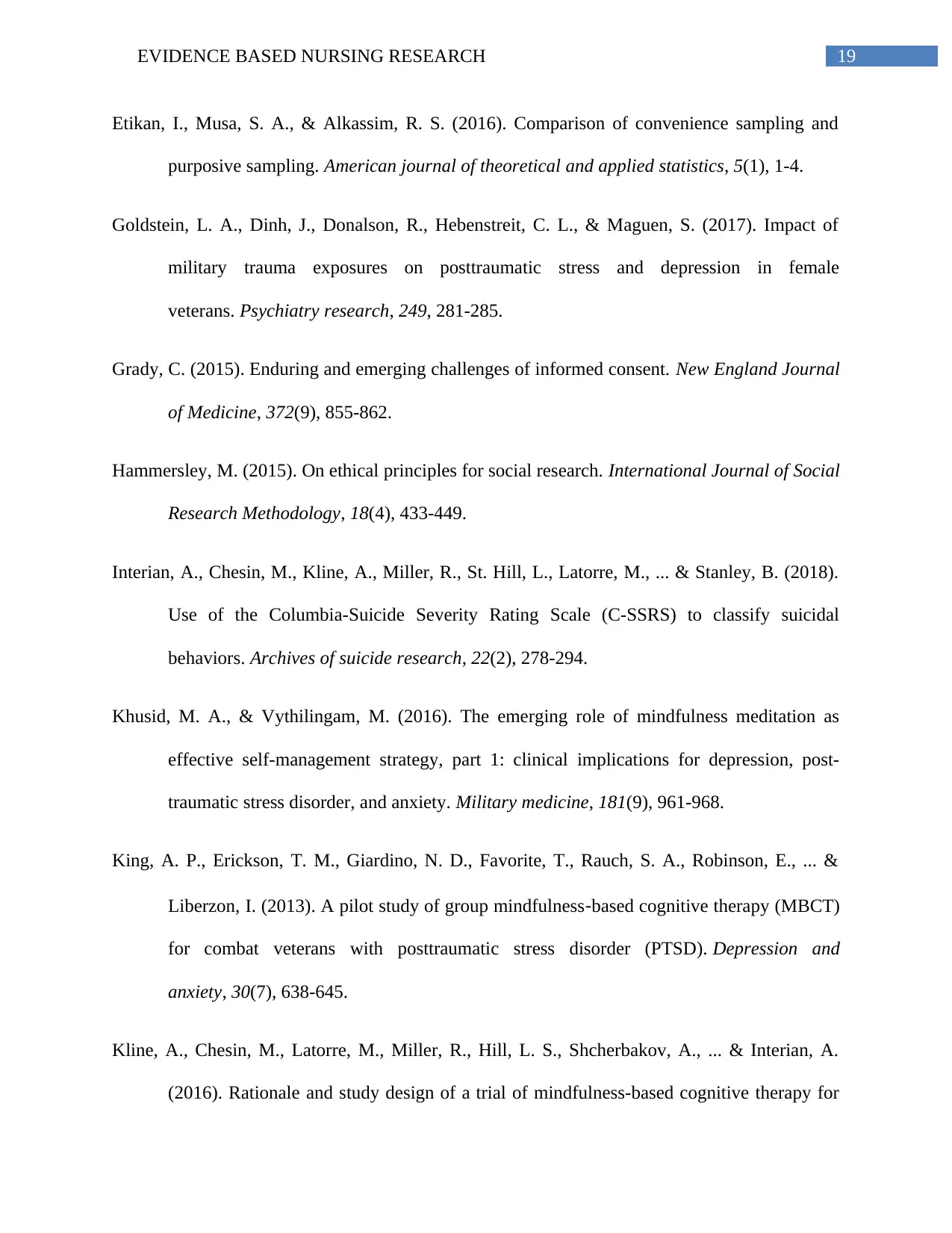
19EVIDENCE BASED NURSING RESEARCH
Etikan, I., Musa, S. A., & Alkassim, R. S. (2016). Comparison of convenience sampling and
purposive sampling. American journal of theoretical and applied statistics, 5(1), 1-4.
Goldstein, L. A., Dinh, J., Donalson, R., Hebenstreit, C. L., & Maguen, S. (2017). Impact of
military trauma exposures on posttraumatic stress and depression in female
veterans. Psychiatry research, 249, 281-285.
Grady, C. (2015). Enduring and emerging challenges of informed consent. New England Journal
of Medicine, 372(9), 855-862.
Hammersley, M. (2015). On ethical principles for social research. International Journal of Social
Research Methodology, 18(4), 433-449.
Interian, A., Chesin, M., Kline, A., Miller, R., St. Hill, L., Latorre, M., ... & Stanley, B. (2018).
Use of the Columbia-Suicide Severity Rating Scale (C-SSRS) to classify suicidal
behaviors. Archives of suicide research, 22(2), 278-294.
Khusid, M. A., & Vythilingam, M. (2016). The emerging role of mindfulness meditation as
effective self-management strategy, part 1: clinical implications for depression, post-
traumatic stress disorder, and anxiety. Military medicine, 181(9), 961-968.
King, A. P., Erickson, T. M., Giardino, N. D., Favorite, T., Rauch, S. A., Robinson, E., ... &
Liberzon, I. (2013). A pilot study of group mindfulness‐based cognitive therapy (MBCT)
for combat veterans with posttraumatic stress disorder (PTSD). Depression and
anxiety, 30(7), 638-645.
Kline, A., Chesin, M., Latorre, M., Miller, R., Hill, L. S., Shcherbakov, A., ... & Interian, A.
(2016). Rationale and study design of a trial of mindfulness-based cognitive therapy for
Etikan, I., Musa, S. A., & Alkassim, R. S. (2016). Comparison of convenience sampling and
purposive sampling. American journal of theoretical and applied statistics, 5(1), 1-4.
Goldstein, L. A., Dinh, J., Donalson, R., Hebenstreit, C. L., & Maguen, S. (2017). Impact of
military trauma exposures on posttraumatic stress and depression in female
veterans. Psychiatry research, 249, 281-285.
Grady, C. (2015). Enduring and emerging challenges of informed consent. New England Journal
of Medicine, 372(9), 855-862.
Hammersley, M. (2015). On ethical principles for social research. International Journal of Social
Research Methodology, 18(4), 433-449.
Interian, A., Chesin, M., Kline, A., Miller, R., St. Hill, L., Latorre, M., ... & Stanley, B. (2018).
Use of the Columbia-Suicide Severity Rating Scale (C-SSRS) to classify suicidal
behaviors. Archives of suicide research, 22(2), 278-294.
Khusid, M. A., & Vythilingam, M. (2016). The emerging role of mindfulness meditation as
effective self-management strategy, part 1: clinical implications for depression, post-
traumatic stress disorder, and anxiety. Military medicine, 181(9), 961-968.
King, A. P., Erickson, T. M., Giardino, N. D., Favorite, T., Rauch, S. A., Robinson, E., ... &
Liberzon, I. (2013). A pilot study of group mindfulness‐based cognitive therapy (MBCT)
for combat veterans with posttraumatic stress disorder (PTSD). Depression and
anxiety, 30(7), 638-645.
Kline, A., Chesin, M., Latorre, M., Miller, R., Hill, L. S., Shcherbakov, A., ... & Interian, A.
(2016). Rationale and study design of a trial of mindfulness-based cognitive therapy for
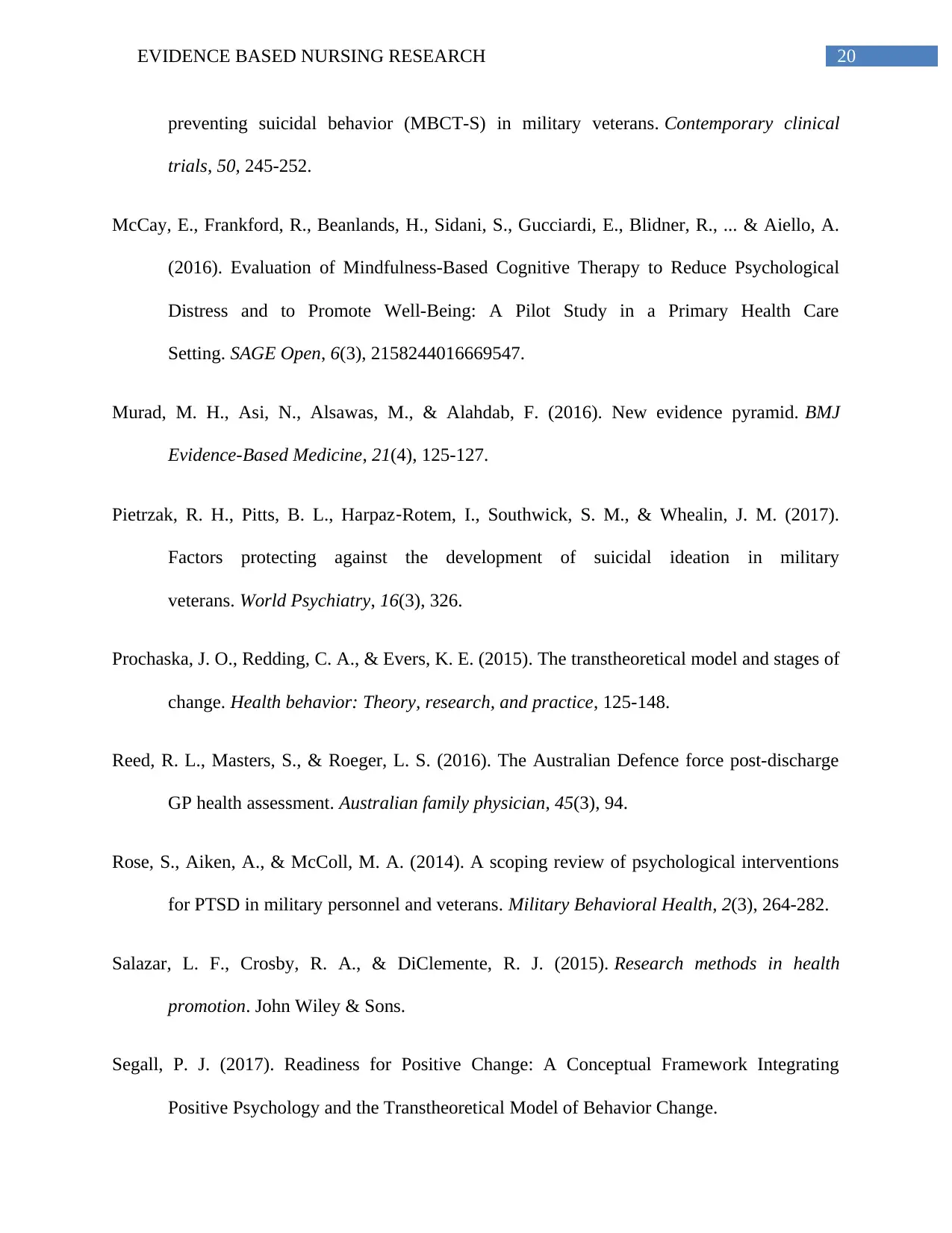
20EVIDENCE BASED NURSING RESEARCH
preventing suicidal behavior (MBCT-S) in military veterans. Contemporary clinical
trials, 50, 245-252.
McCay, E., Frankford, R., Beanlands, H., Sidani, S., Gucciardi, E., Blidner, R., ... & Aiello, A.
(2016). Evaluation of Mindfulness-Based Cognitive Therapy to Reduce Psychological
Distress and to Promote Well-Being: A Pilot Study in a Primary Health Care
Setting. SAGE Open, 6(3), 2158244016669547.
Murad, M. H., Asi, N., Alsawas, M., & Alahdab, F. (2016). New evidence pyramid. BMJ
Evidence-Based Medicine, 21(4), 125-127.
Pietrzak, R. H., Pitts, B. L., Harpaz‐Rotem, I., Southwick, S. M., & Whealin, J. M. (2017).
Factors protecting against the development of suicidal ideation in military
veterans. World Psychiatry, 16(3), 326.
Prochaska, J. O., Redding, C. A., & Evers, K. E. (2015). The transtheoretical model and stages of
change. Health behavior: Theory, research, and practice, 125-148.
Reed, R. L., Masters, S., & Roeger, L. S. (2016). The Australian Defence force post-discharge
GP health assessment. Australian family physician, 45(3), 94.
Rose, S., Aiken, A., & McColl, M. A. (2014). A scoping review of psychological interventions
for PTSD in military personnel and veterans. Military Behavioral Health, 2(3), 264-282.
Salazar, L. F., Crosby, R. A., & DiClemente, R. J. (2015). Research methods in health
promotion. John Wiley & Sons.
Segall, P. J. (2017). Readiness for Positive Change: A Conceptual Framework Integrating
Positive Psychology and the Transtheoretical Model of Behavior Change.
preventing suicidal behavior (MBCT-S) in military veterans. Contemporary clinical
trials, 50, 245-252.
McCay, E., Frankford, R., Beanlands, H., Sidani, S., Gucciardi, E., Blidner, R., ... & Aiello, A.
(2016). Evaluation of Mindfulness-Based Cognitive Therapy to Reduce Psychological
Distress and to Promote Well-Being: A Pilot Study in a Primary Health Care
Setting. SAGE Open, 6(3), 2158244016669547.
Murad, M. H., Asi, N., Alsawas, M., & Alahdab, F. (2016). New evidence pyramid. BMJ
Evidence-Based Medicine, 21(4), 125-127.
Pietrzak, R. H., Pitts, B. L., Harpaz‐Rotem, I., Southwick, S. M., & Whealin, J. M. (2017).
Factors protecting against the development of suicidal ideation in military
veterans. World Psychiatry, 16(3), 326.
Prochaska, J. O., Redding, C. A., & Evers, K. E. (2015). The transtheoretical model and stages of
change. Health behavior: Theory, research, and practice, 125-148.
Reed, R. L., Masters, S., & Roeger, L. S. (2016). The Australian Defence force post-discharge
GP health assessment. Australian family physician, 45(3), 94.
Rose, S., Aiken, A., & McColl, M. A. (2014). A scoping review of psychological interventions
for PTSD in military personnel and veterans. Military Behavioral Health, 2(3), 264-282.
Salazar, L. F., Crosby, R. A., & DiClemente, R. J. (2015). Research methods in health
promotion. John Wiley & Sons.
Segall, P. J. (2017). Readiness for Positive Change: A Conceptual Framework Integrating
Positive Psychology and the Transtheoretical Model of Behavior Change.
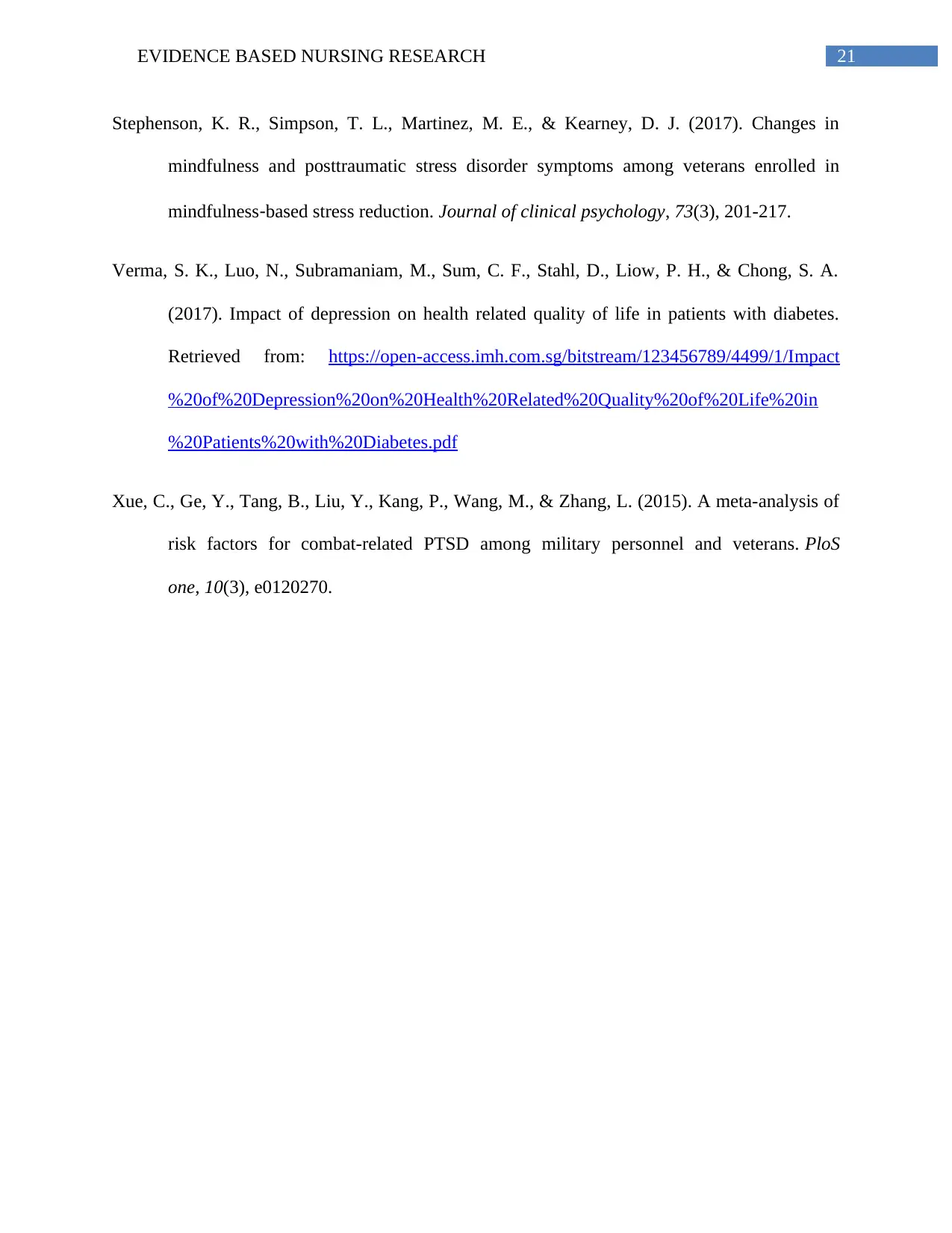
21EVIDENCE BASED NURSING RESEARCH
Stephenson, K. R., Simpson, T. L., Martinez, M. E., & Kearney, D. J. (2017). Changes in
mindfulness and posttraumatic stress disorder symptoms among veterans enrolled in
mindfulness‐based stress reduction. Journal of clinical psychology, 73(3), 201-217.
Verma, S. K., Luo, N., Subramaniam, M., Sum, C. F., Stahl, D., Liow, P. H., & Chong, S. A.
(2017). Impact of depression on health related quality of life in patients with diabetes.
Retrieved from: https://open-access.imh.com.sg/bitstream/123456789/4499/1/Impact
%20of%20Depression%20on%20Health%20Related%20Quality%20of%20Life%20in
%20Patients%20with%20Diabetes.pdf
Xue, C., Ge, Y., Tang, B., Liu, Y., Kang, P., Wang, M., & Zhang, L. (2015). A meta-analysis of
risk factors for combat-related PTSD among military personnel and veterans. PloS
one, 10(3), e0120270.
Stephenson, K. R., Simpson, T. L., Martinez, M. E., & Kearney, D. J. (2017). Changes in
mindfulness and posttraumatic stress disorder symptoms among veterans enrolled in
mindfulness‐based stress reduction. Journal of clinical psychology, 73(3), 201-217.
Verma, S. K., Luo, N., Subramaniam, M., Sum, C. F., Stahl, D., Liow, P. H., & Chong, S. A.
(2017). Impact of depression on health related quality of life in patients with diabetes.
Retrieved from: https://open-access.imh.com.sg/bitstream/123456789/4499/1/Impact
%20of%20Depression%20on%20Health%20Related%20Quality%20of%20Life%20in
%20Patients%20with%20Diabetes.pdf
Xue, C., Ge, Y., Tang, B., Liu, Y., Kang, P., Wang, M., & Zhang, L. (2015). A meta-analysis of
risk factors for combat-related PTSD among military personnel and veterans. PloS
one, 10(3), e0120270.
Secure Best Marks with AI Grader
Need help grading? Try our AI Grader for instant feedback on your assignments.
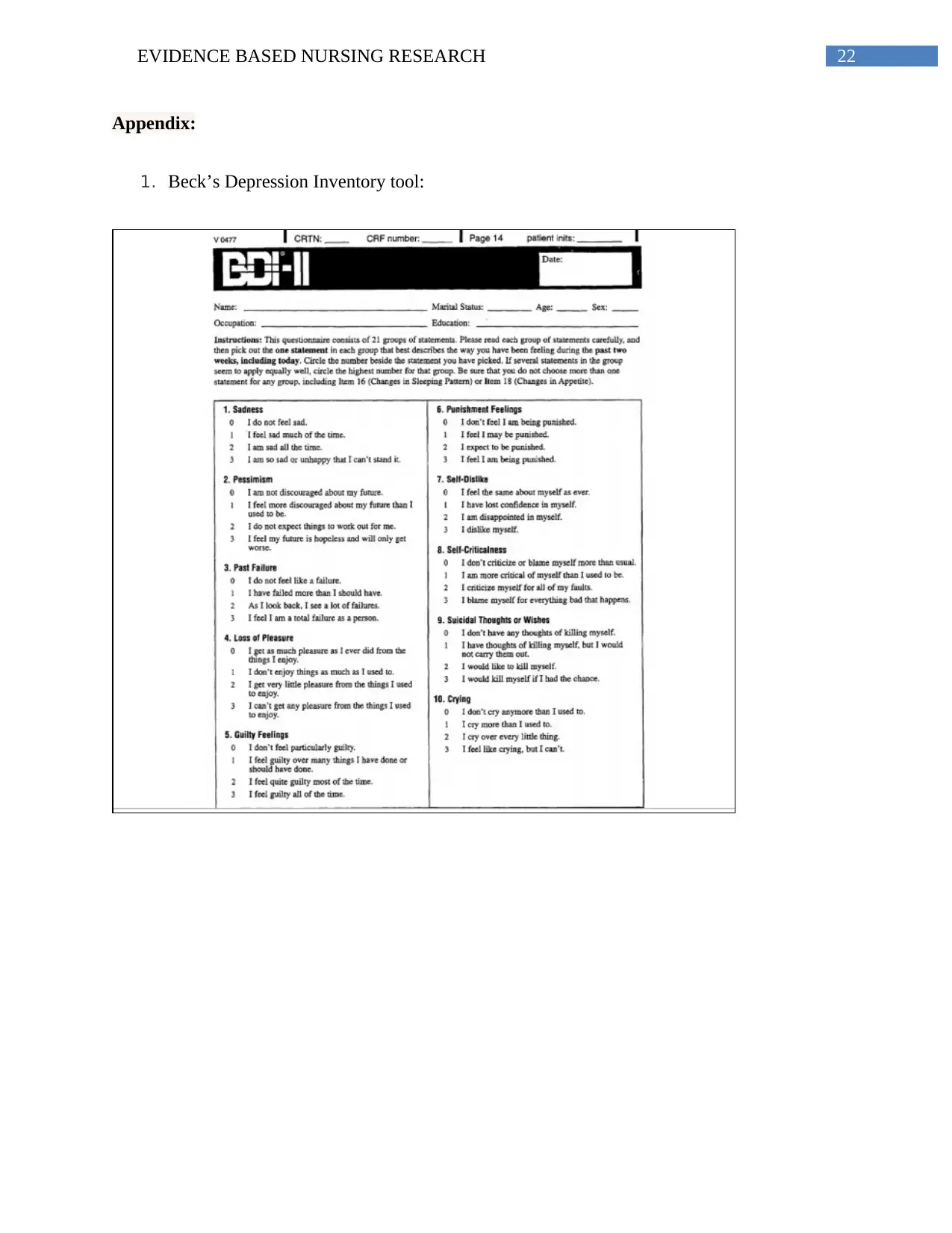
22EVIDENCE BASED NURSING RESEARCH
Appendix:
1. Beck’s Depression Inventory tool:
Appendix:
1. Beck’s Depression Inventory tool:
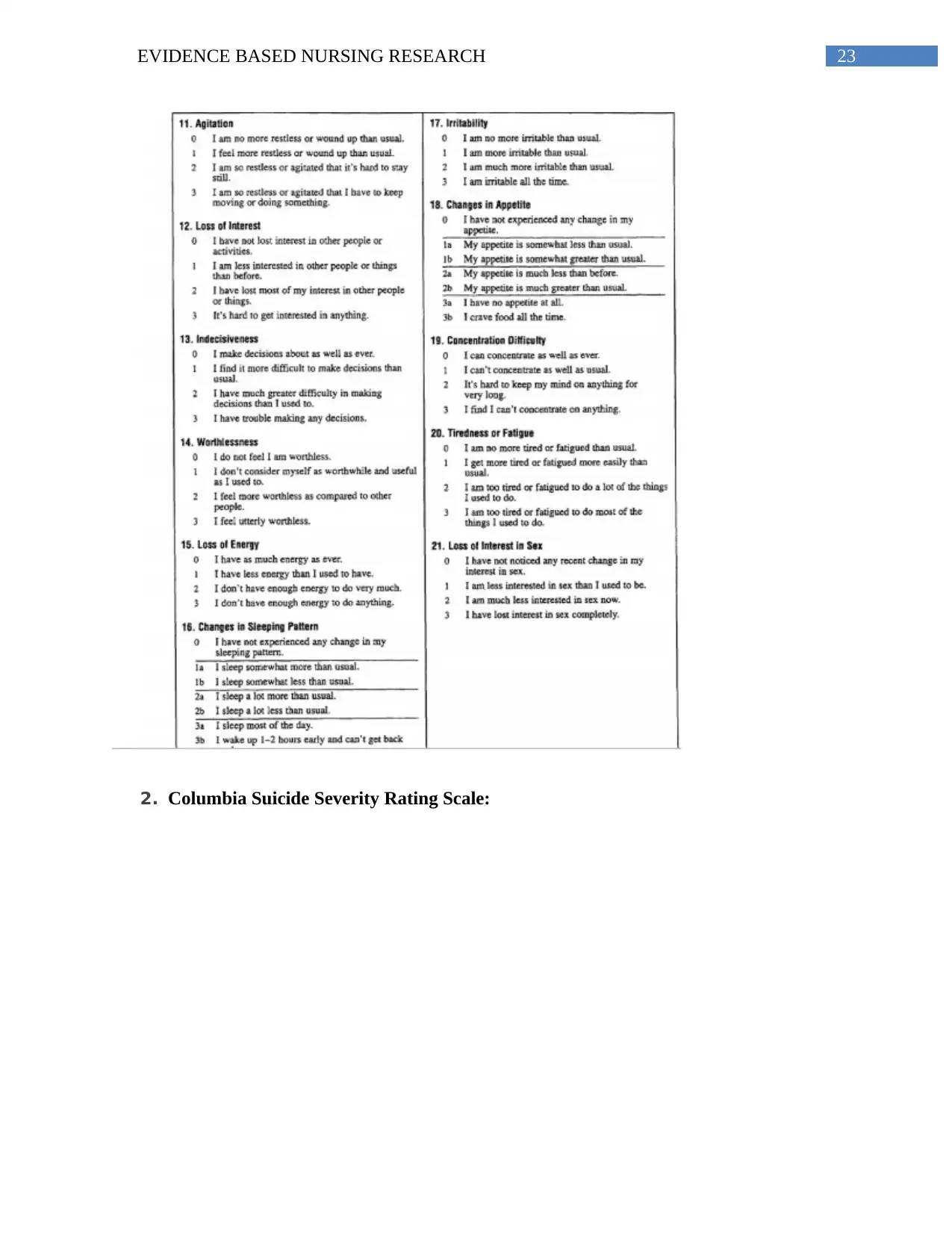
23EVIDENCE BASED NURSING RESEARCH
2. Columbia Suicide Severity Rating Scale:
2. Columbia Suicide Severity Rating Scale:
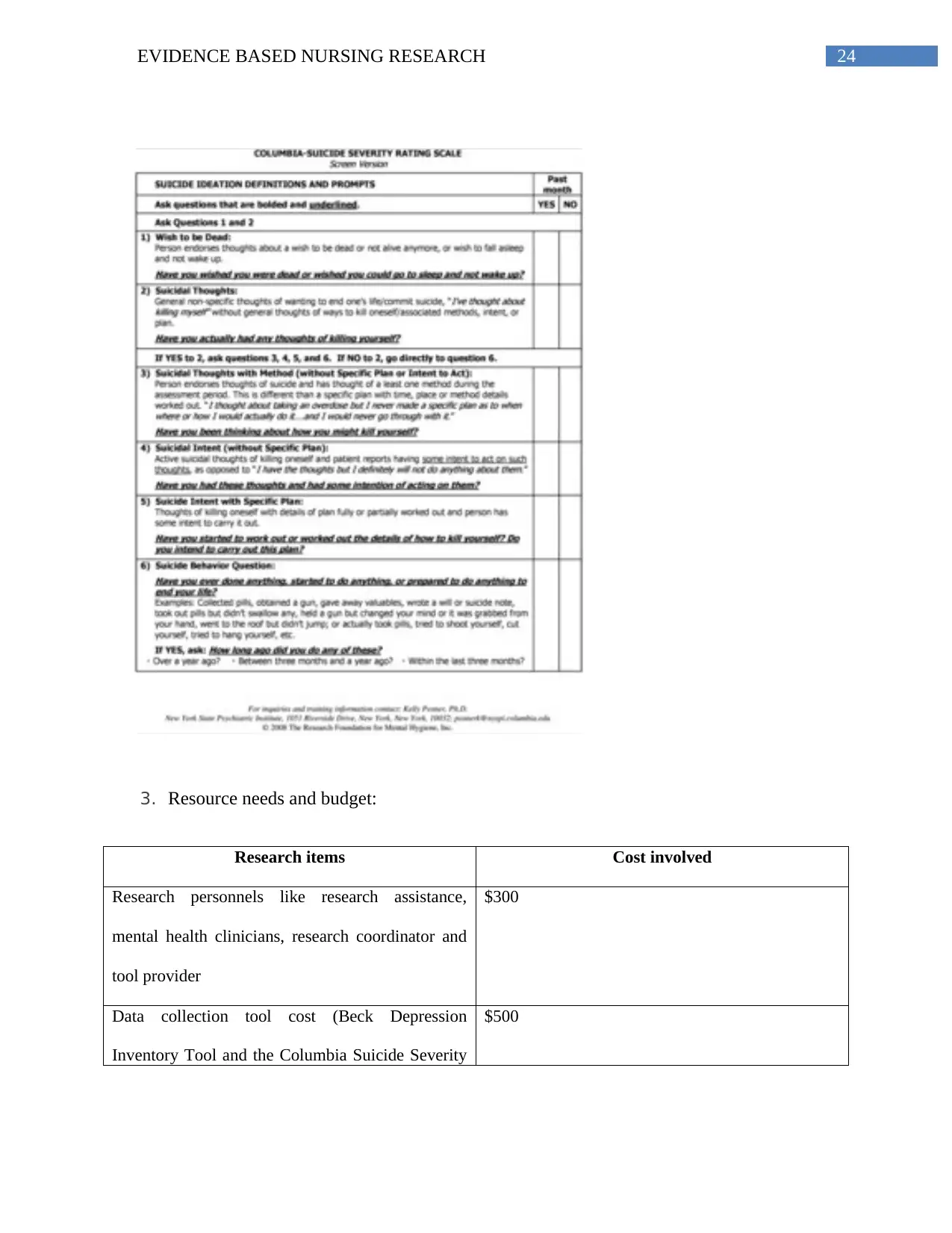
24EVIDENCE BASED NURSING RESEARCH
3. Resource needs and budget:
Research items Cost involved
Research personnels like research assistance,
mental health clinicians, research coordinator and
tool provider
$300
Data collection tool cost (Beck Depression
Inventory Tool and the Columbia Suicide Severity
$500
3. Resource needs and budget:
Research items Cost involved
Research personnels like research assistance,
mental health clinicians, research coordinator and
tool provider
$300
Data collection tool cost (Beck Depression
Inventory Tool and the Columbia Suicide Severity
$500
Paraphrase This Document
Need a fresh take? Get an instant paraphrase of this document with our AI Paraphraser
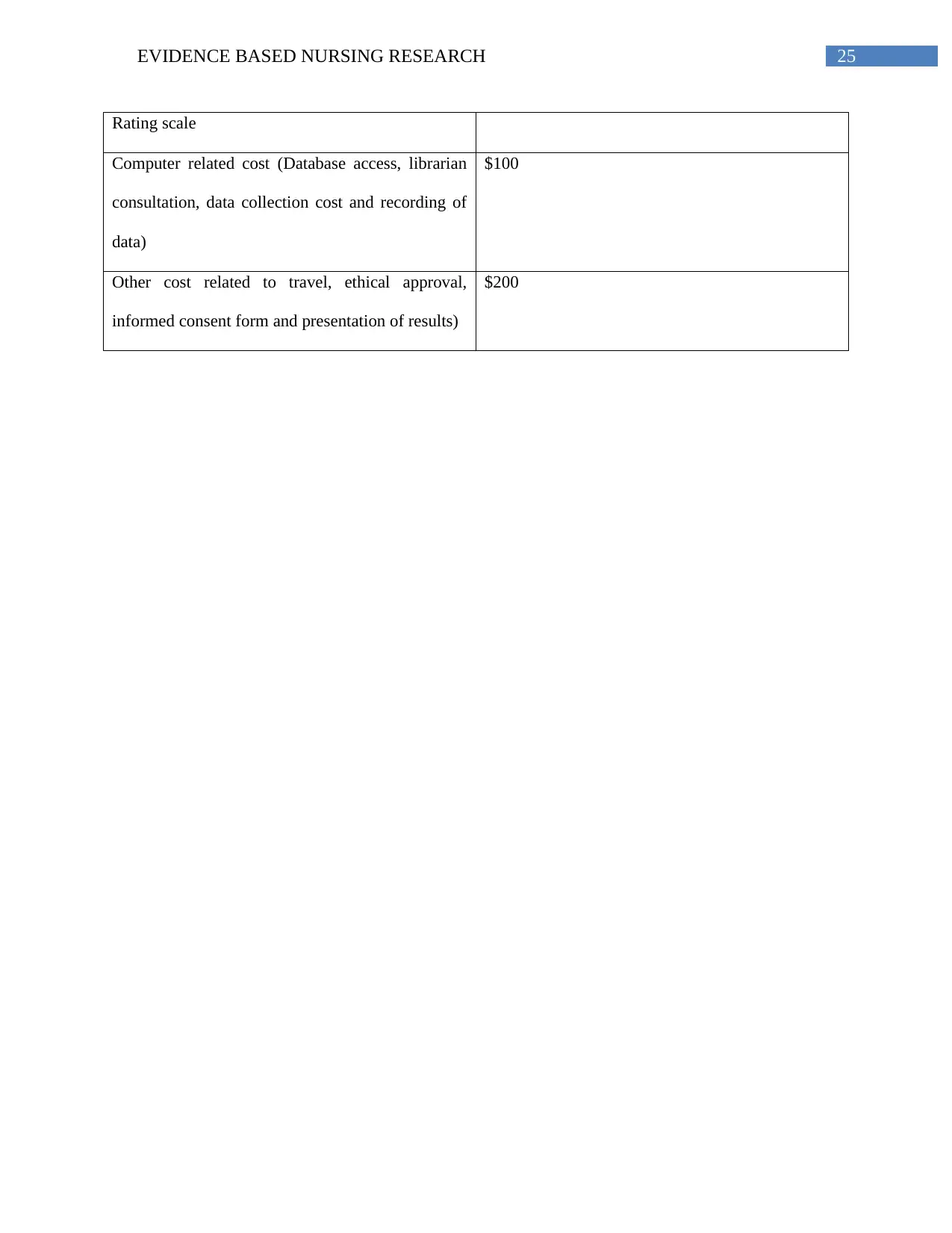
25EVIDENCE BASED NURSING RESEARCH
Rating scale
Computer related cost (Database access, librarian
consultation, data collection cost and recording of
data)
$100
Other cost related to travel, ethical approval,
informed consent form and presentation of results)
$200
Rating scale
Computer related cost (Database access, librarian
consultation, data collection cost and recording of
data)
$100
Other cost related to travel, ethical approval,
informed consent form and presentation of results)
$200
1 out of 26
Related Documents
Your All-in-One AI-Powered Toolkit for Academic Success.
+13062052269
info@desklib.com
Available 24*7 on WhatsApp / Email
![[object Object]](/_next/static/media/star-bottom.7253800d.svg)
Unlock your academic potential
© 2024 | Zucol Services PVT LTD | All rights reserved.





